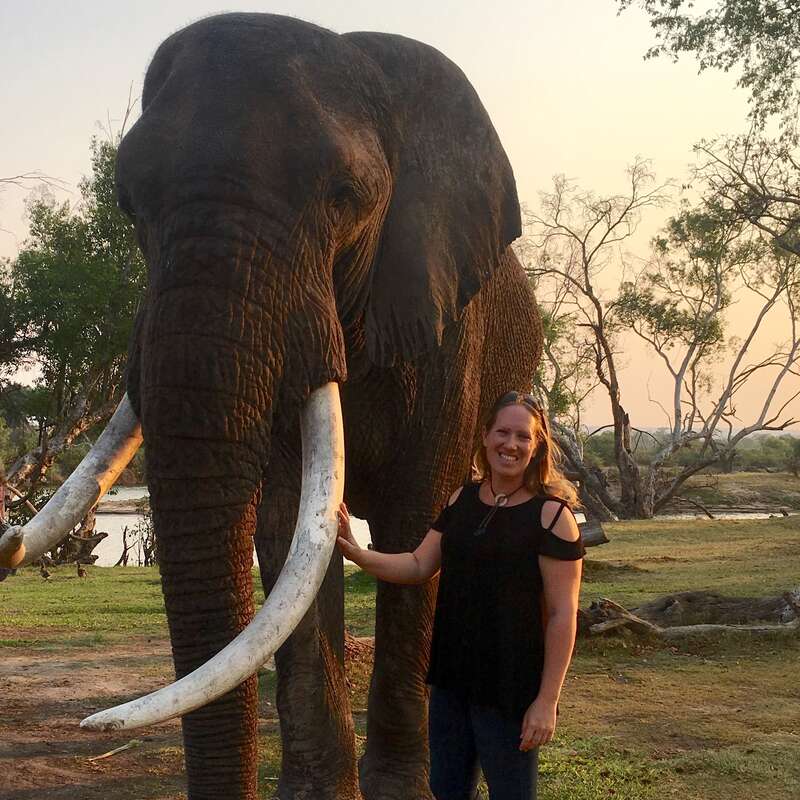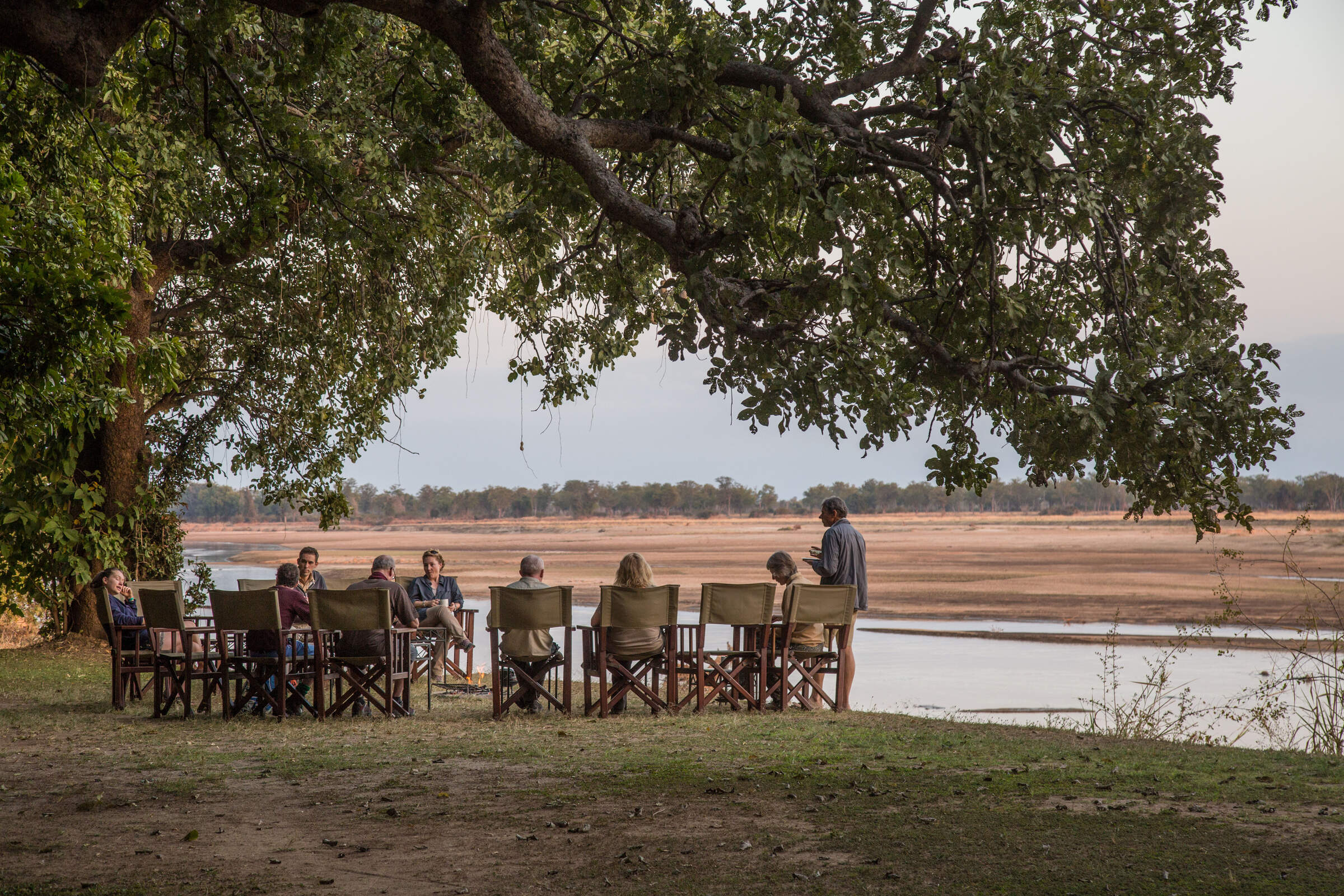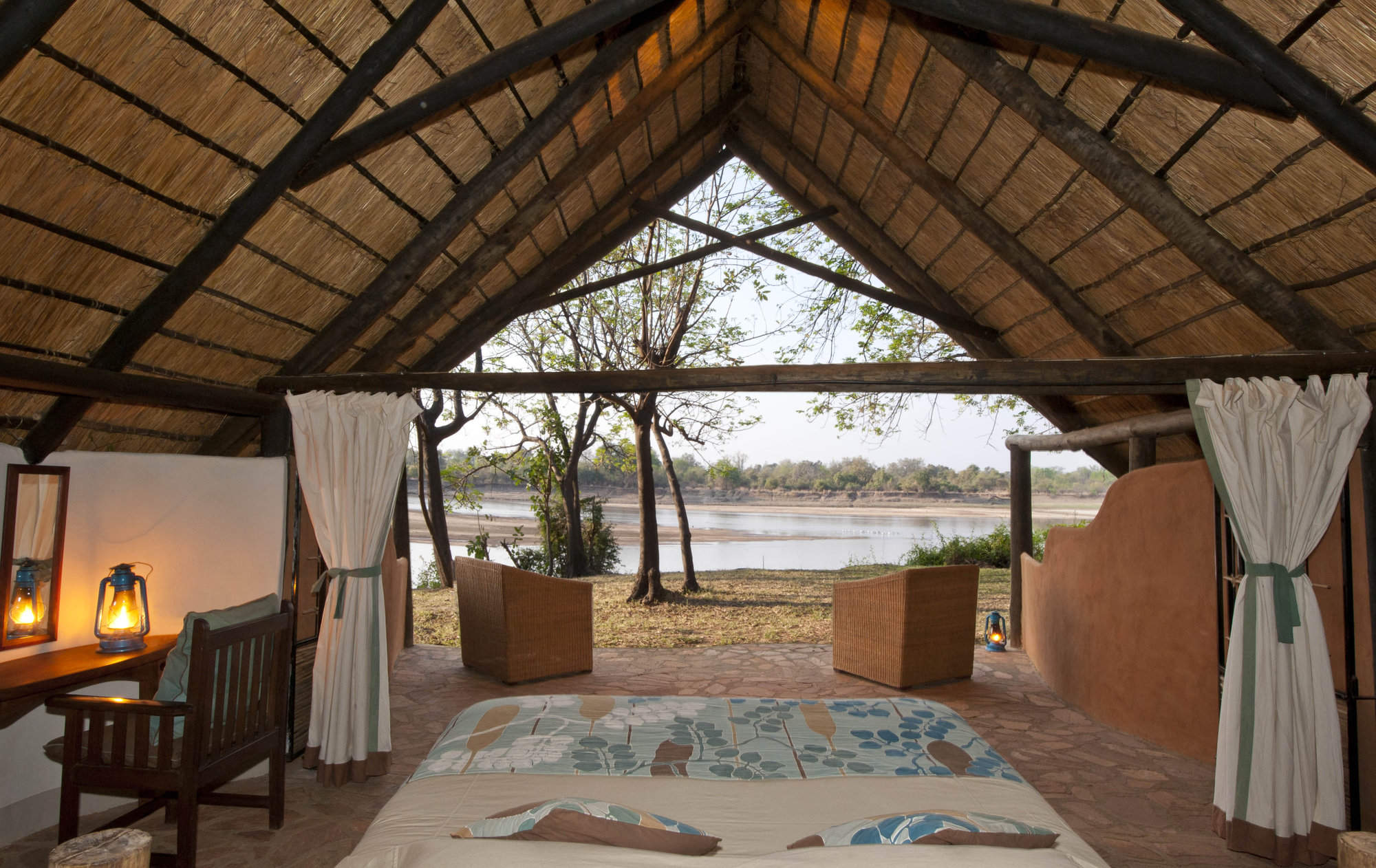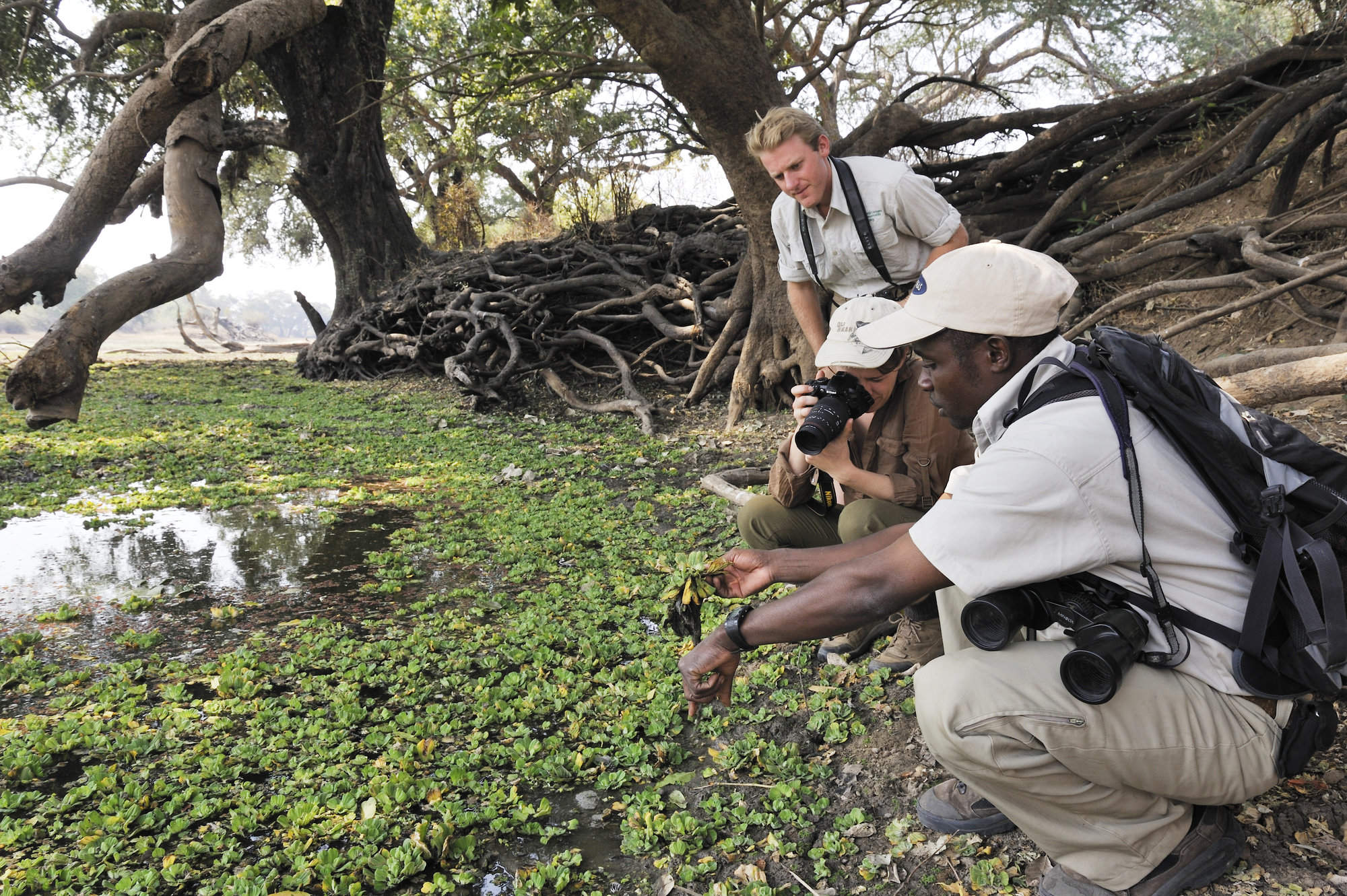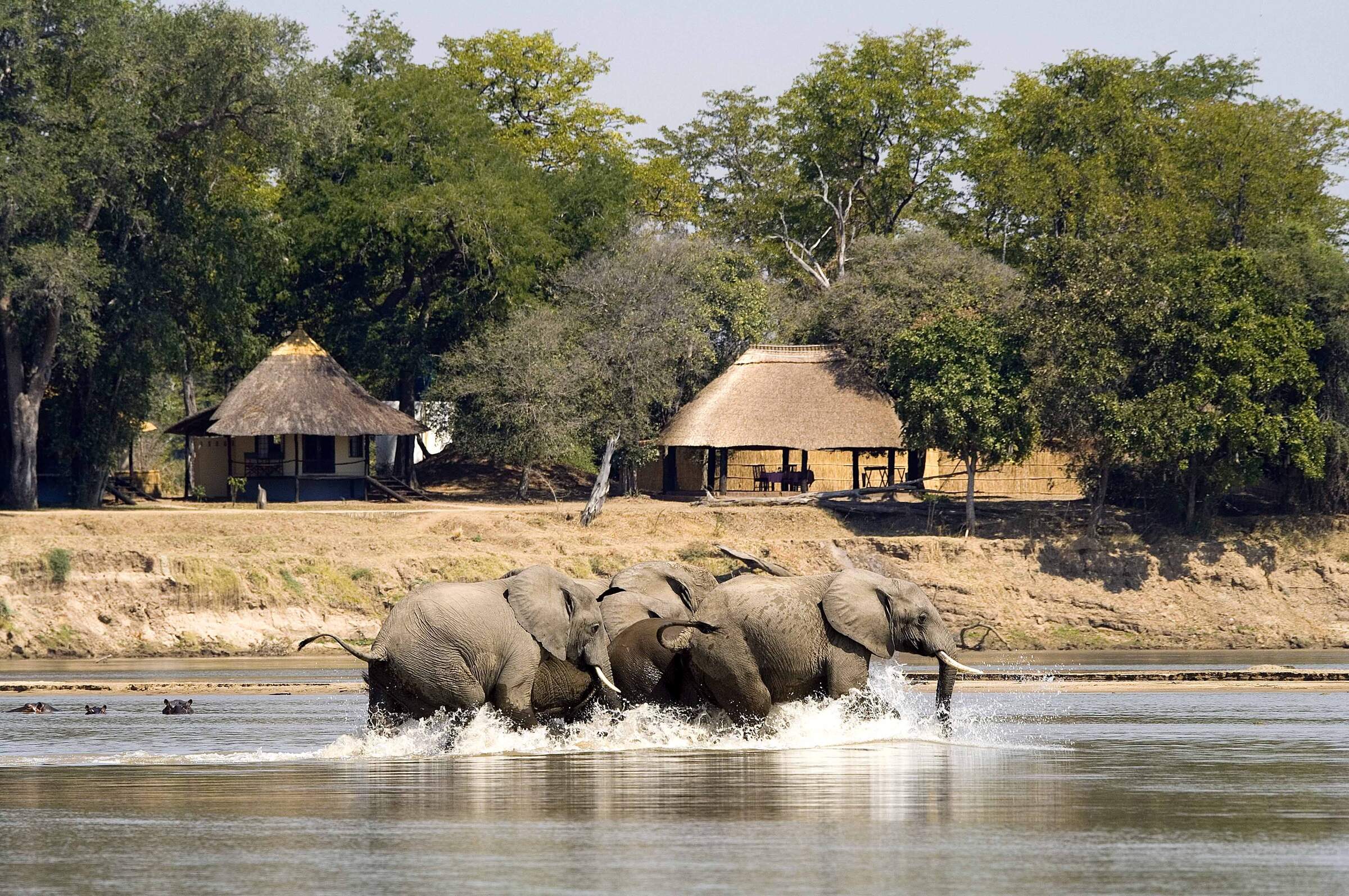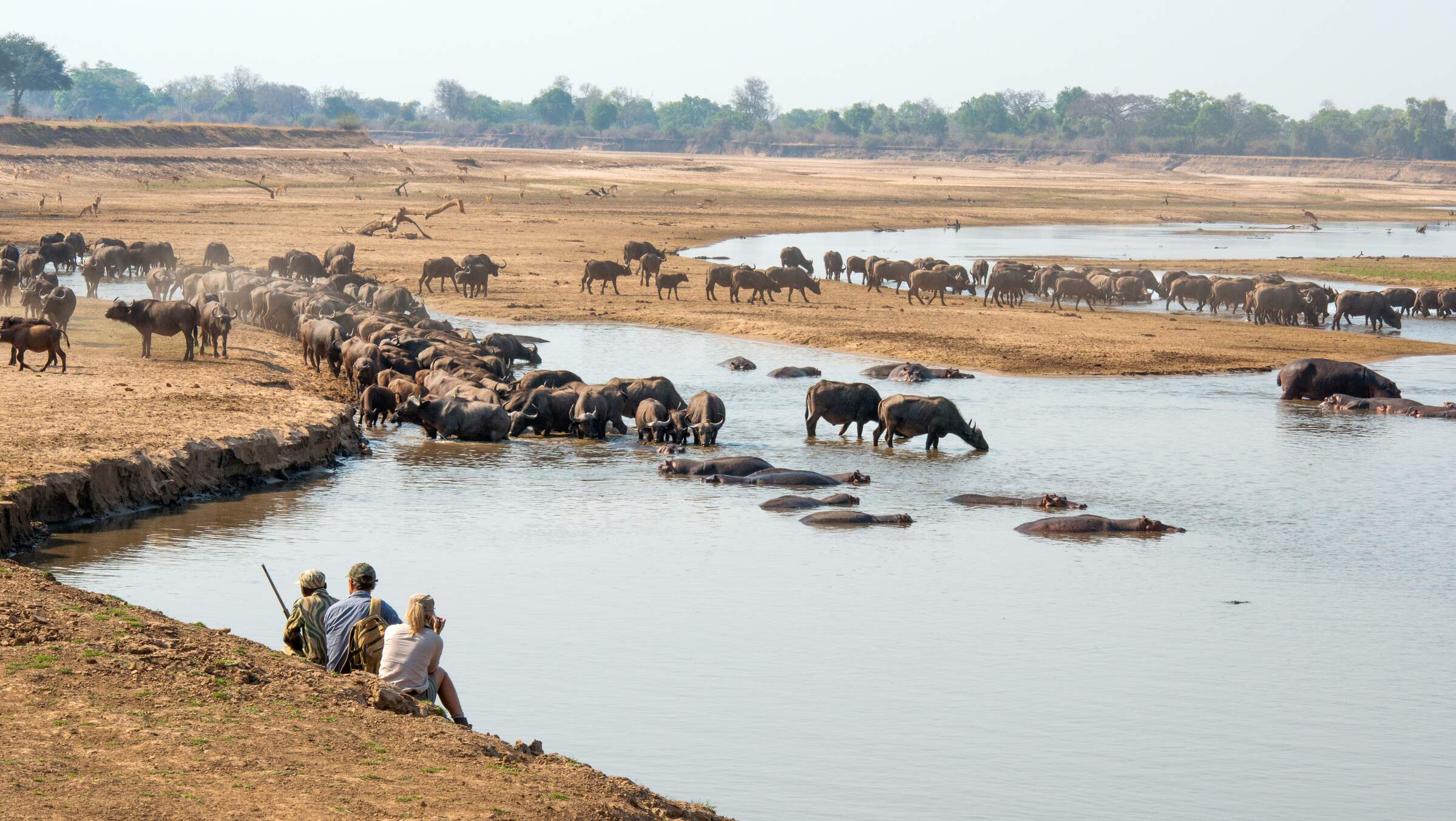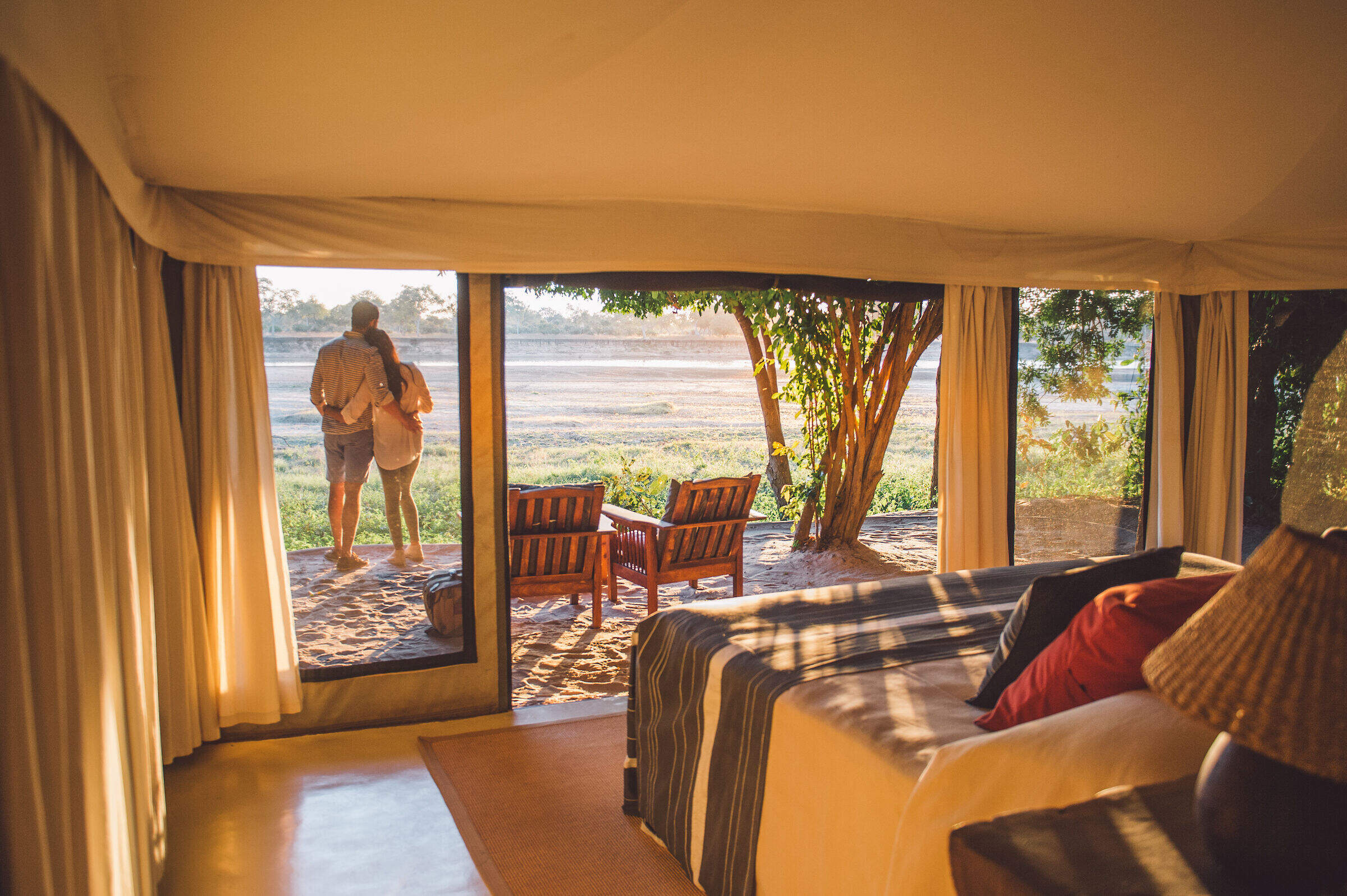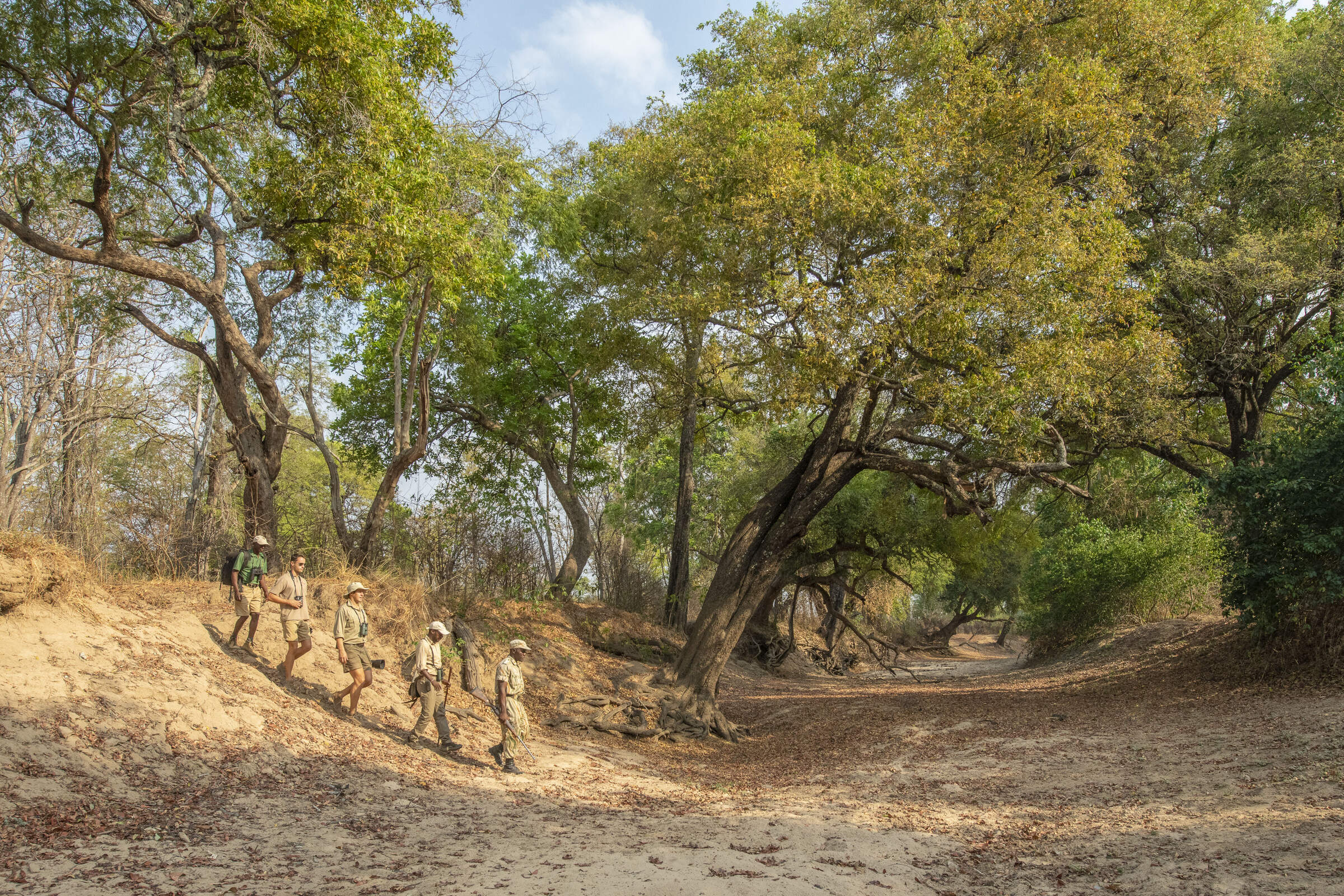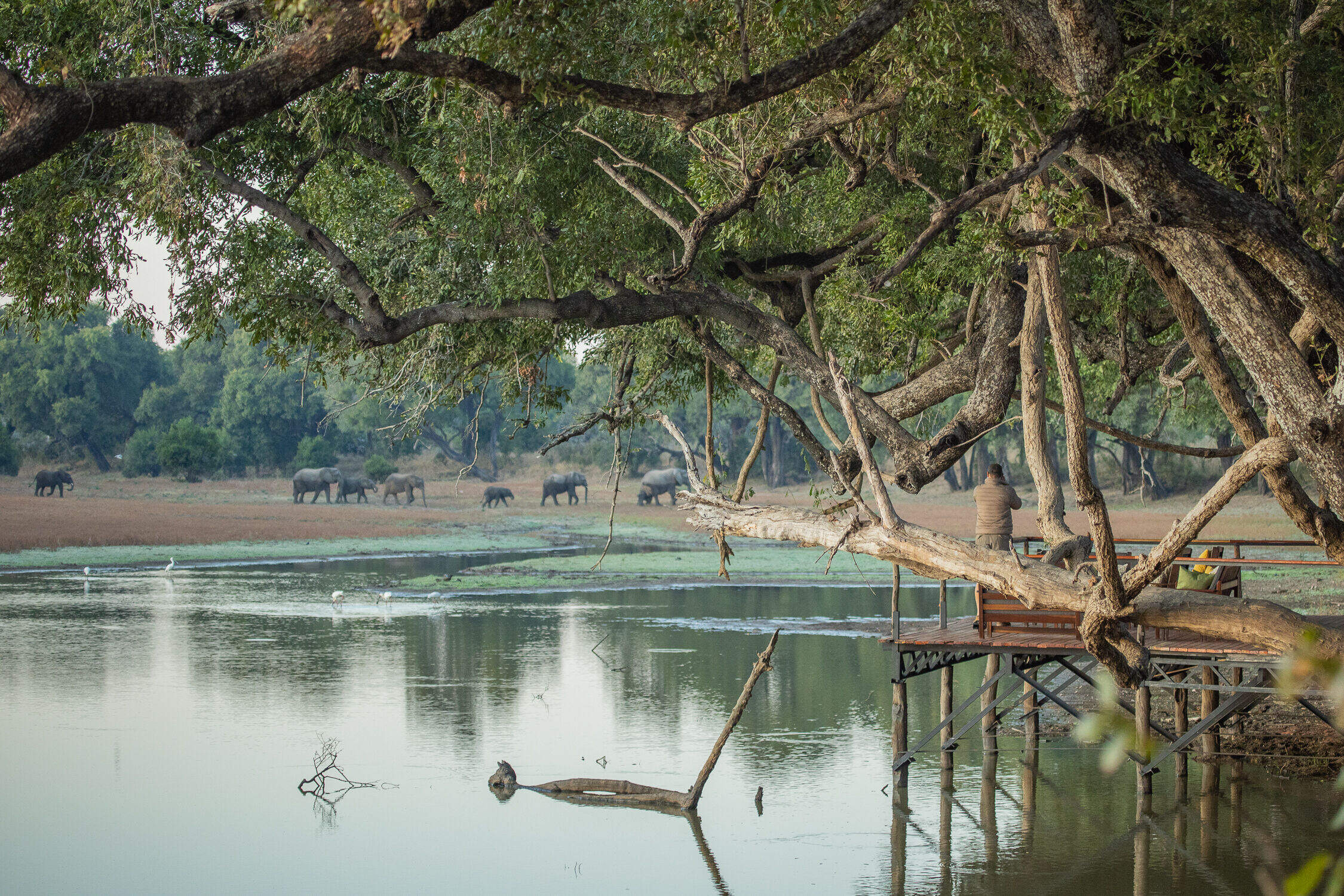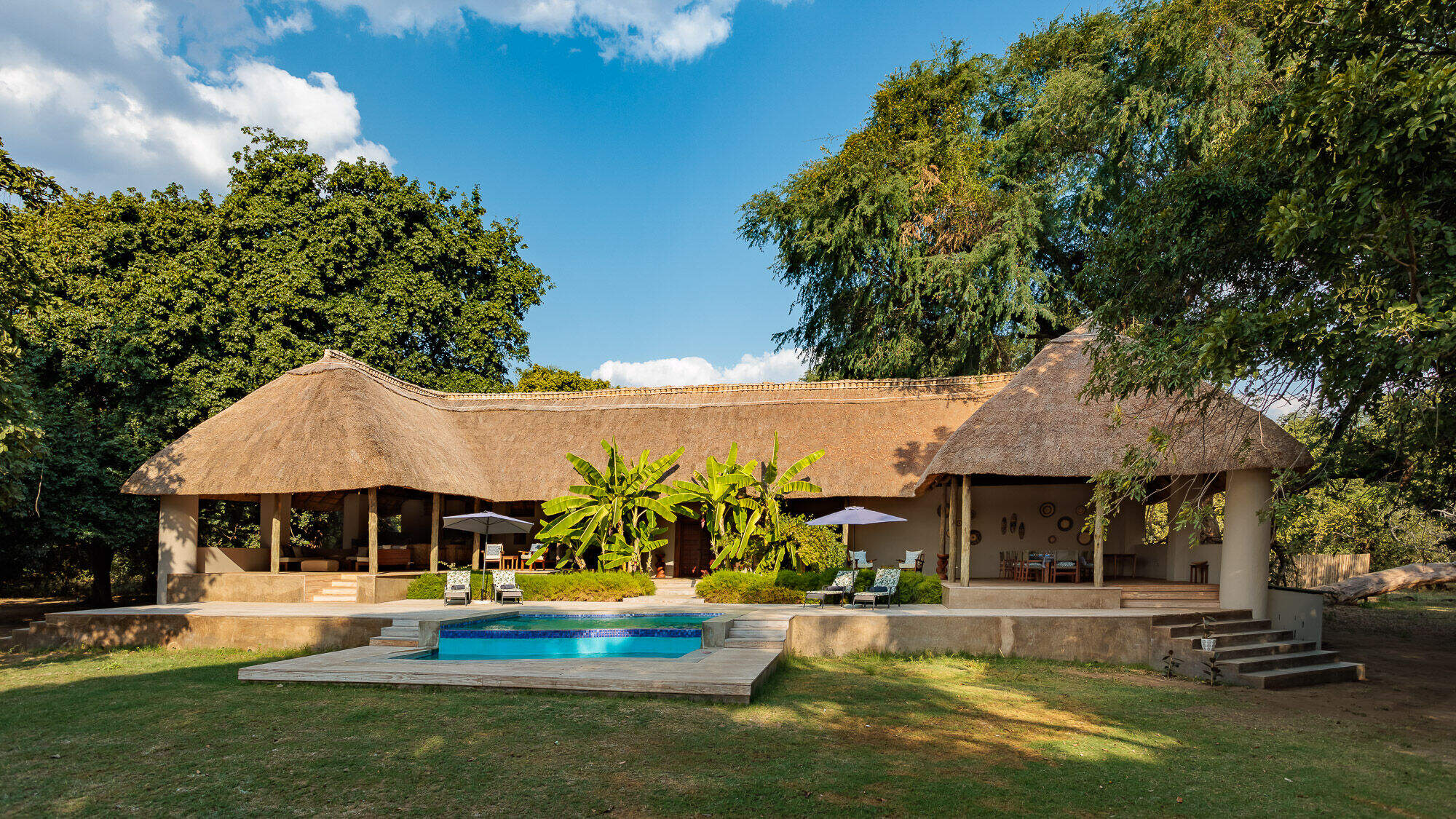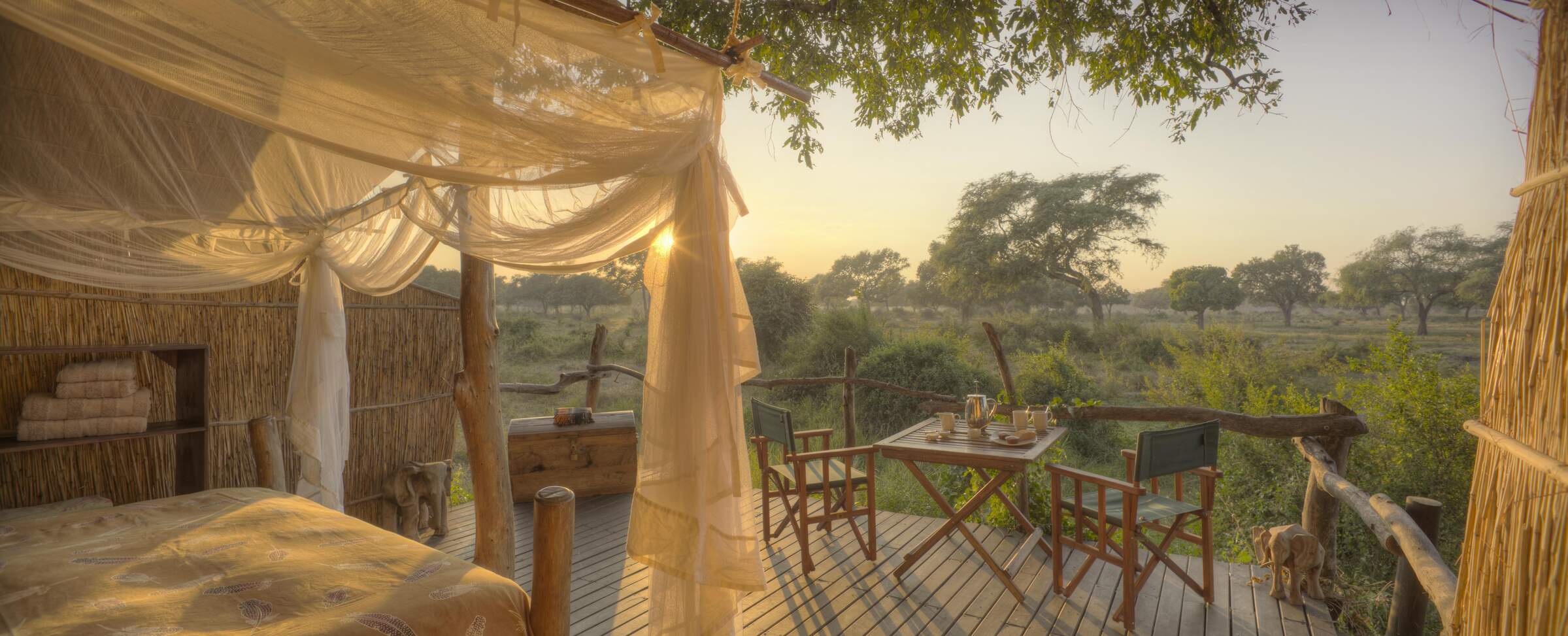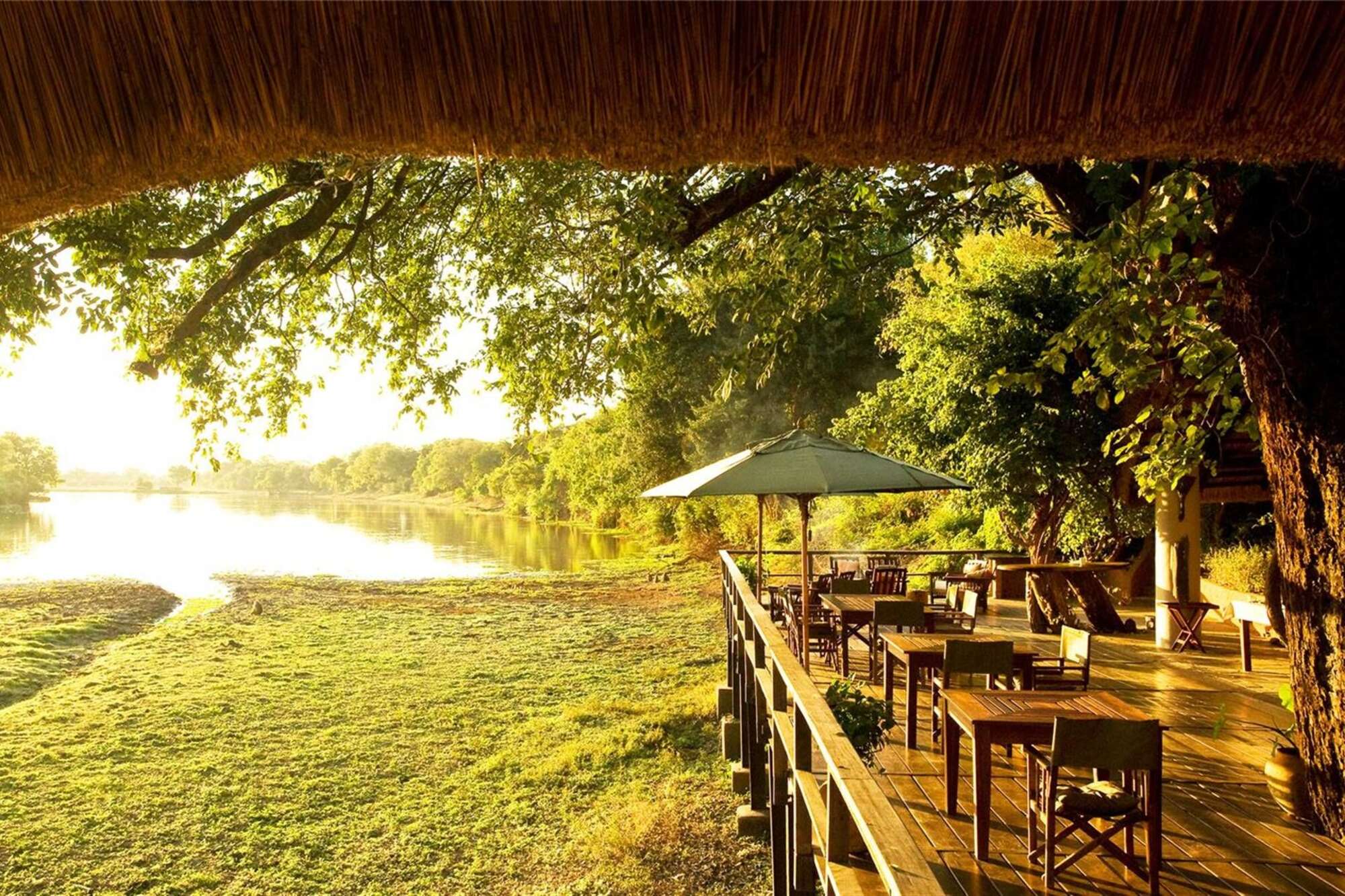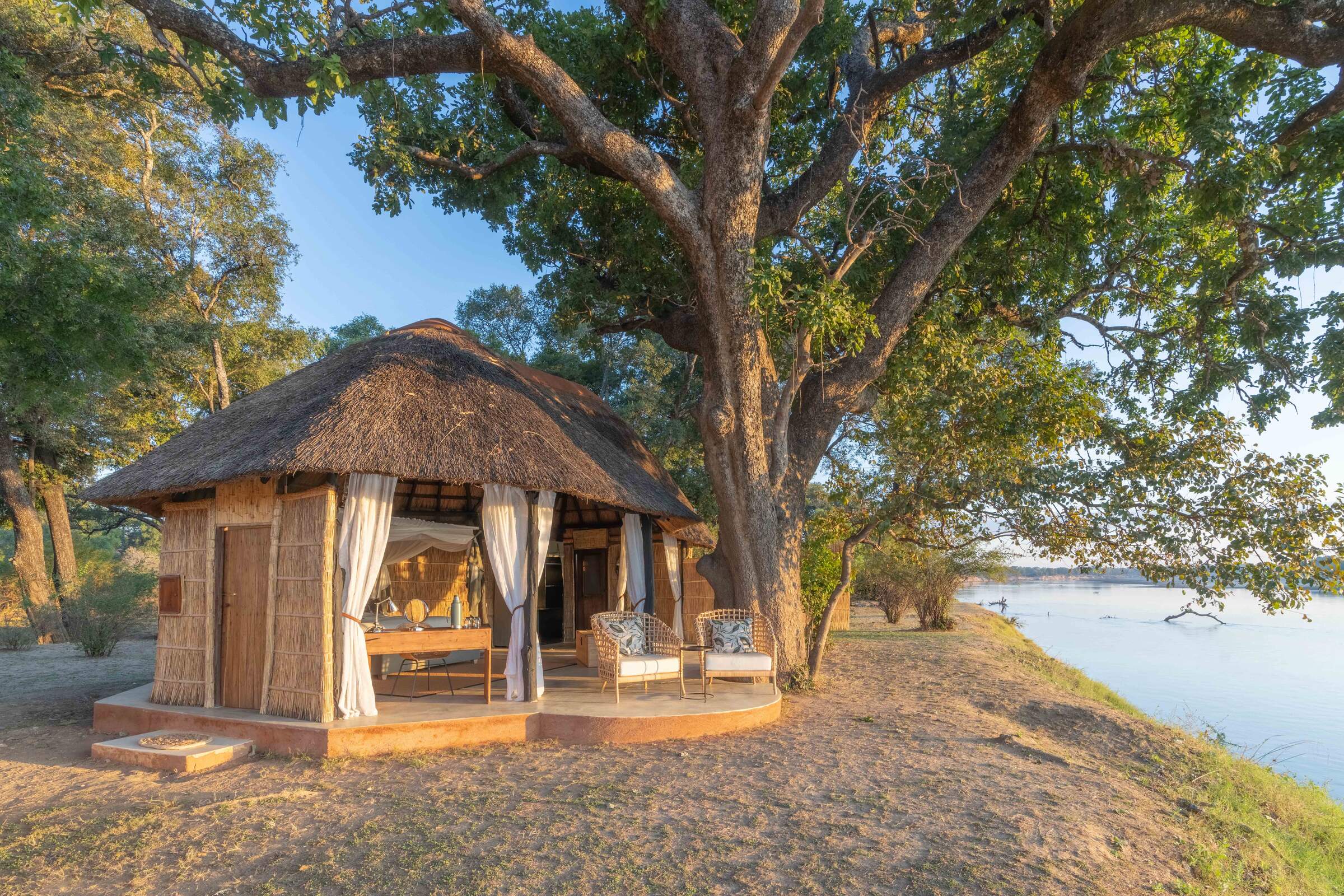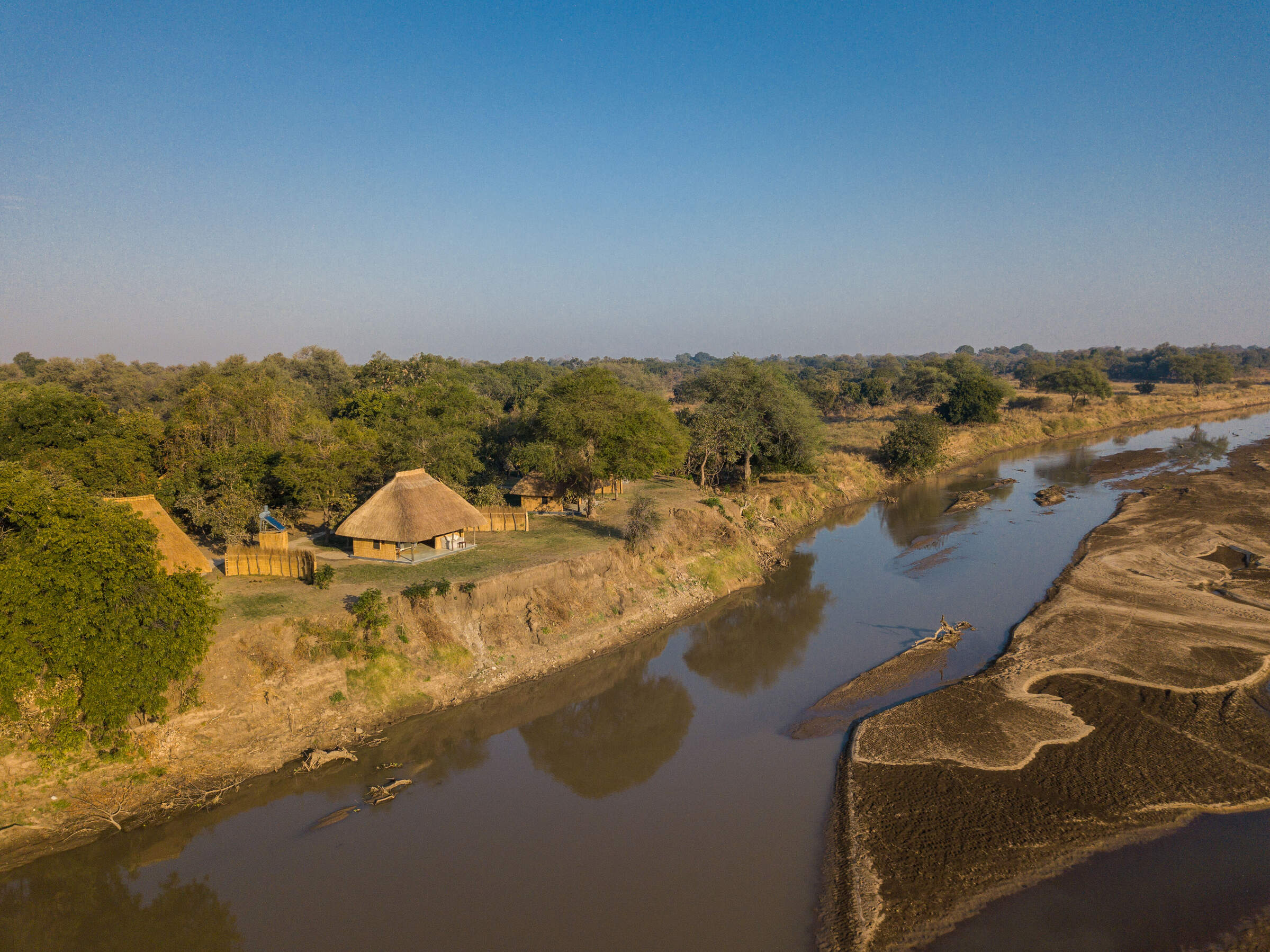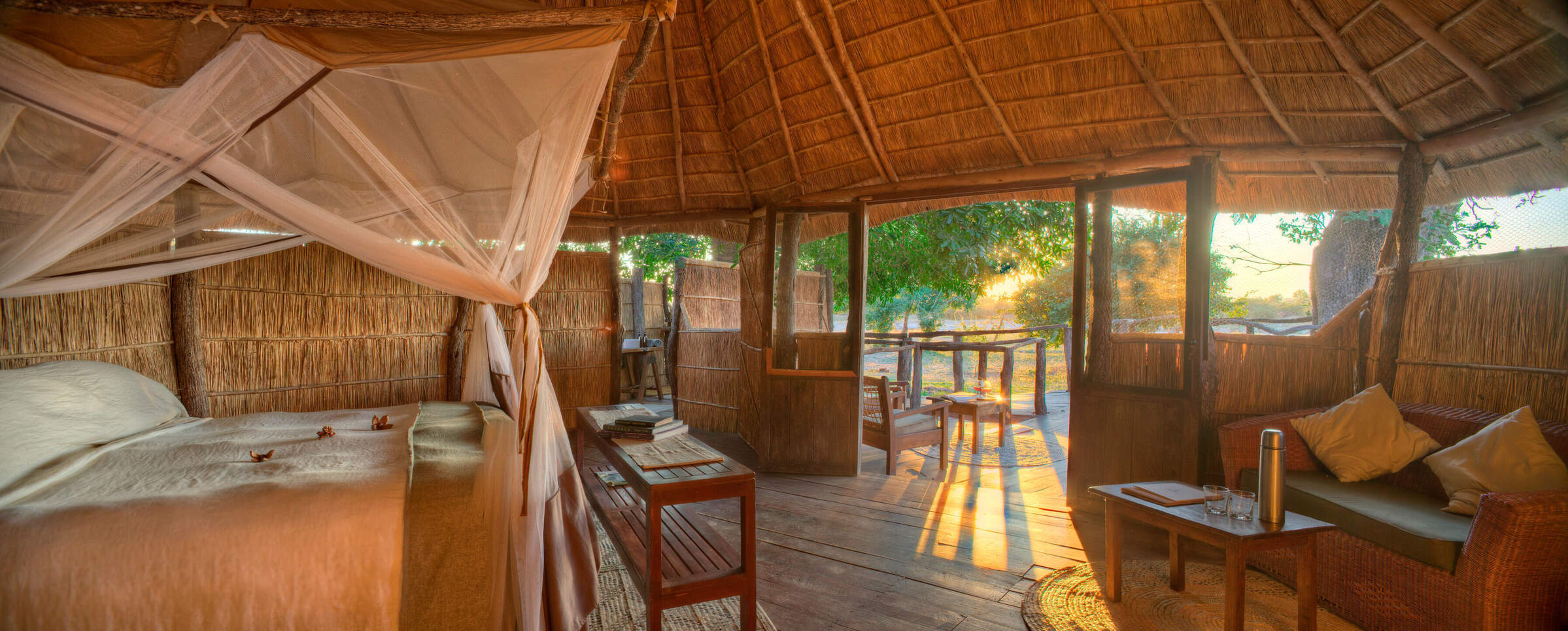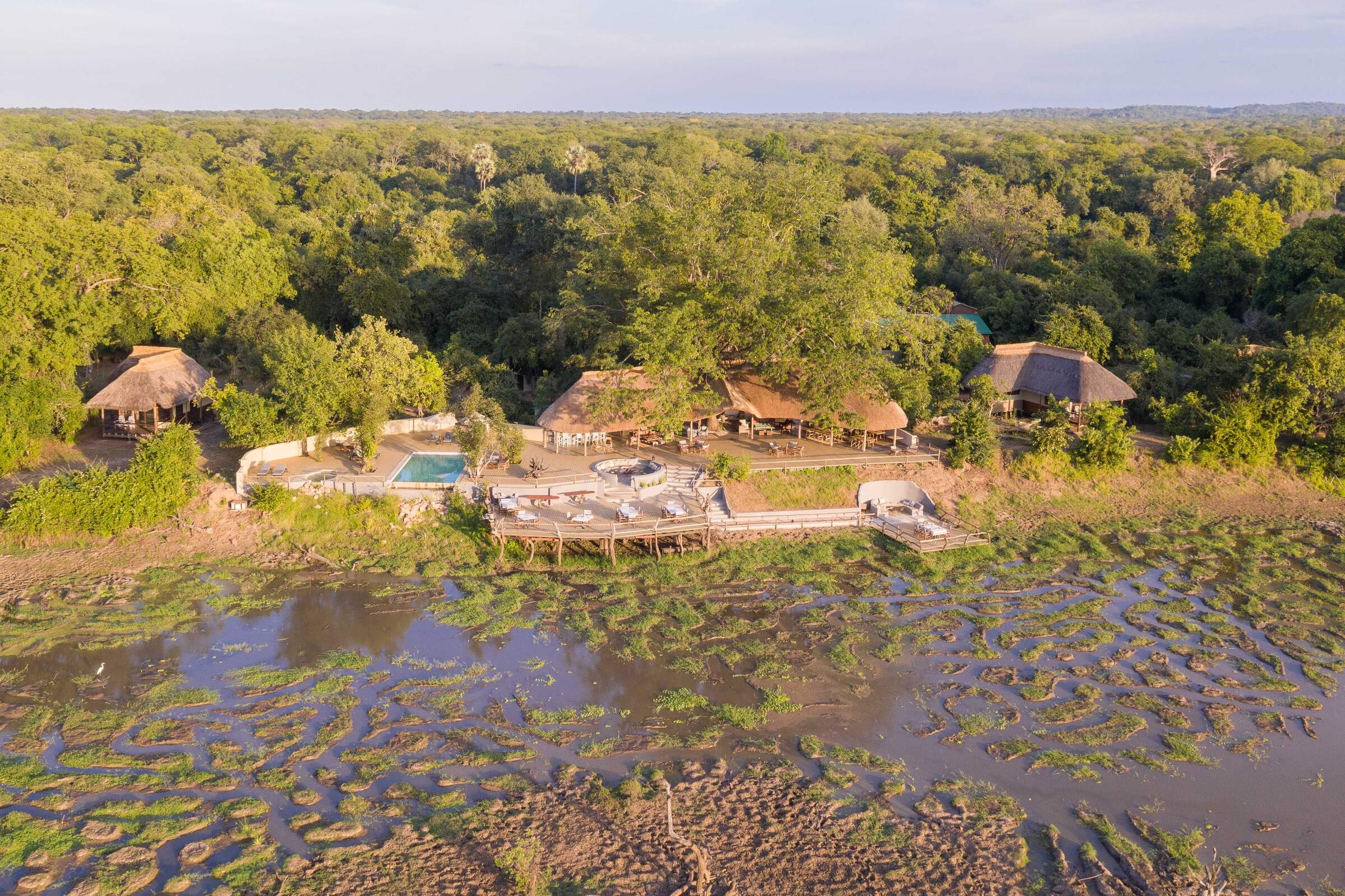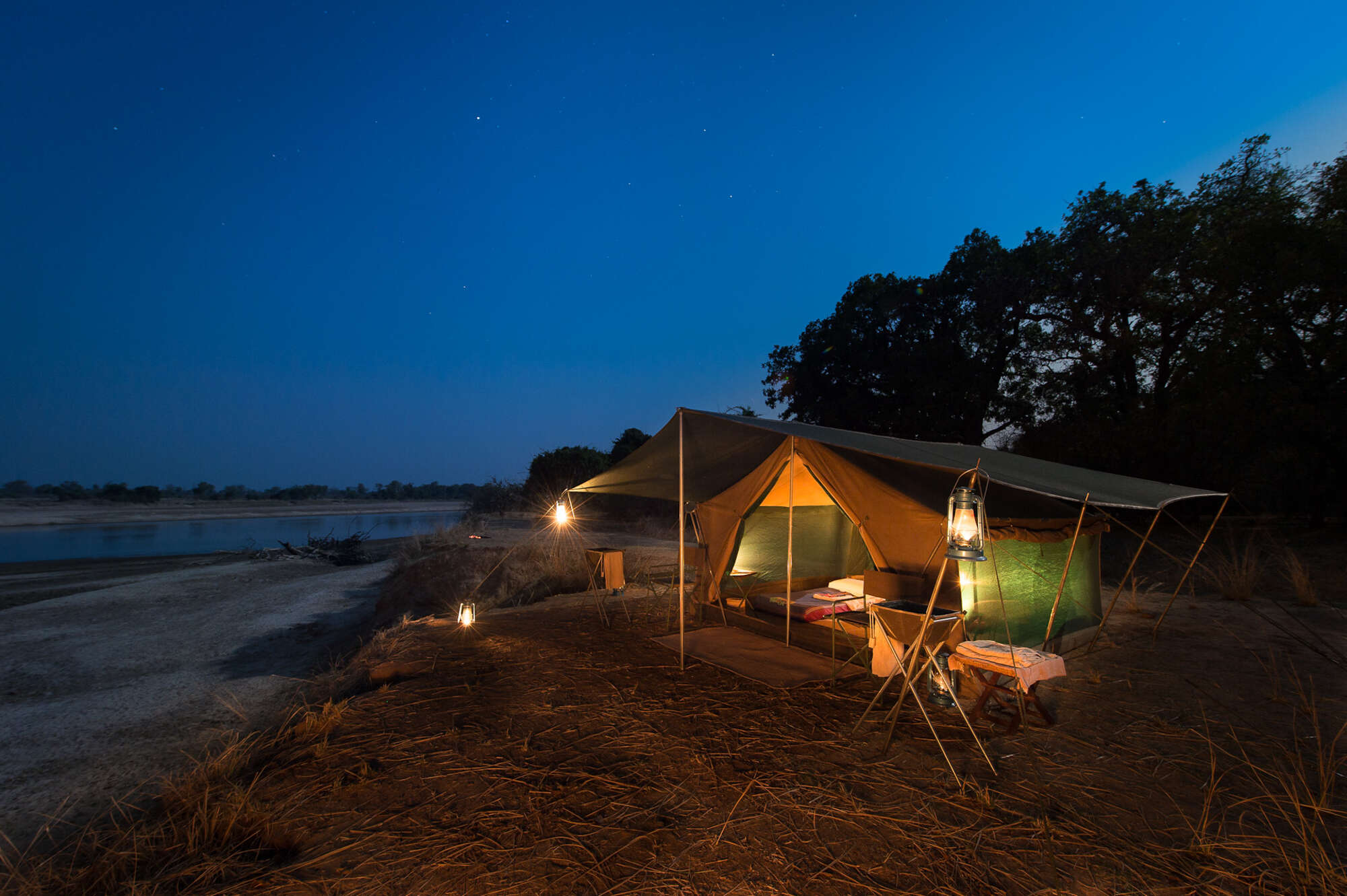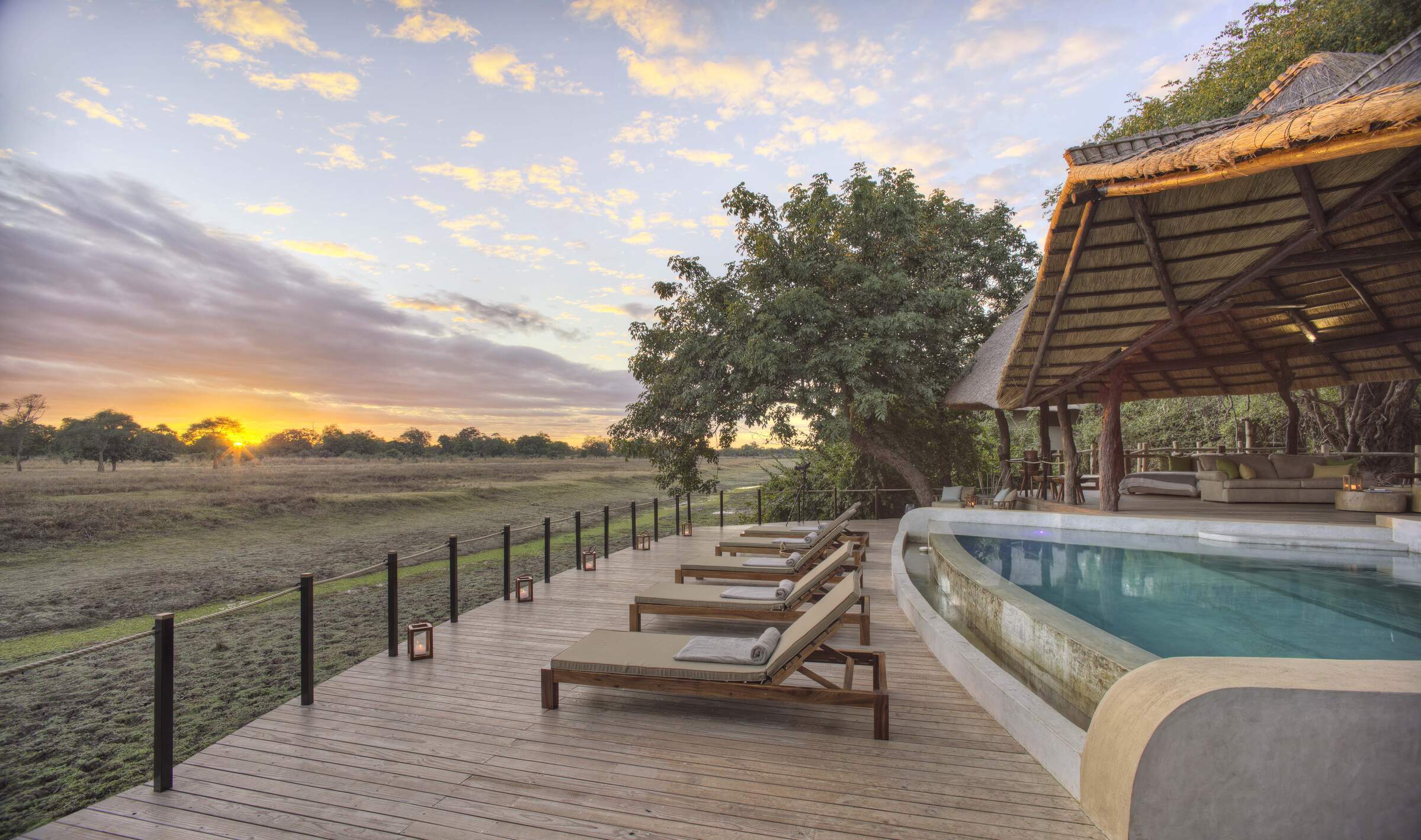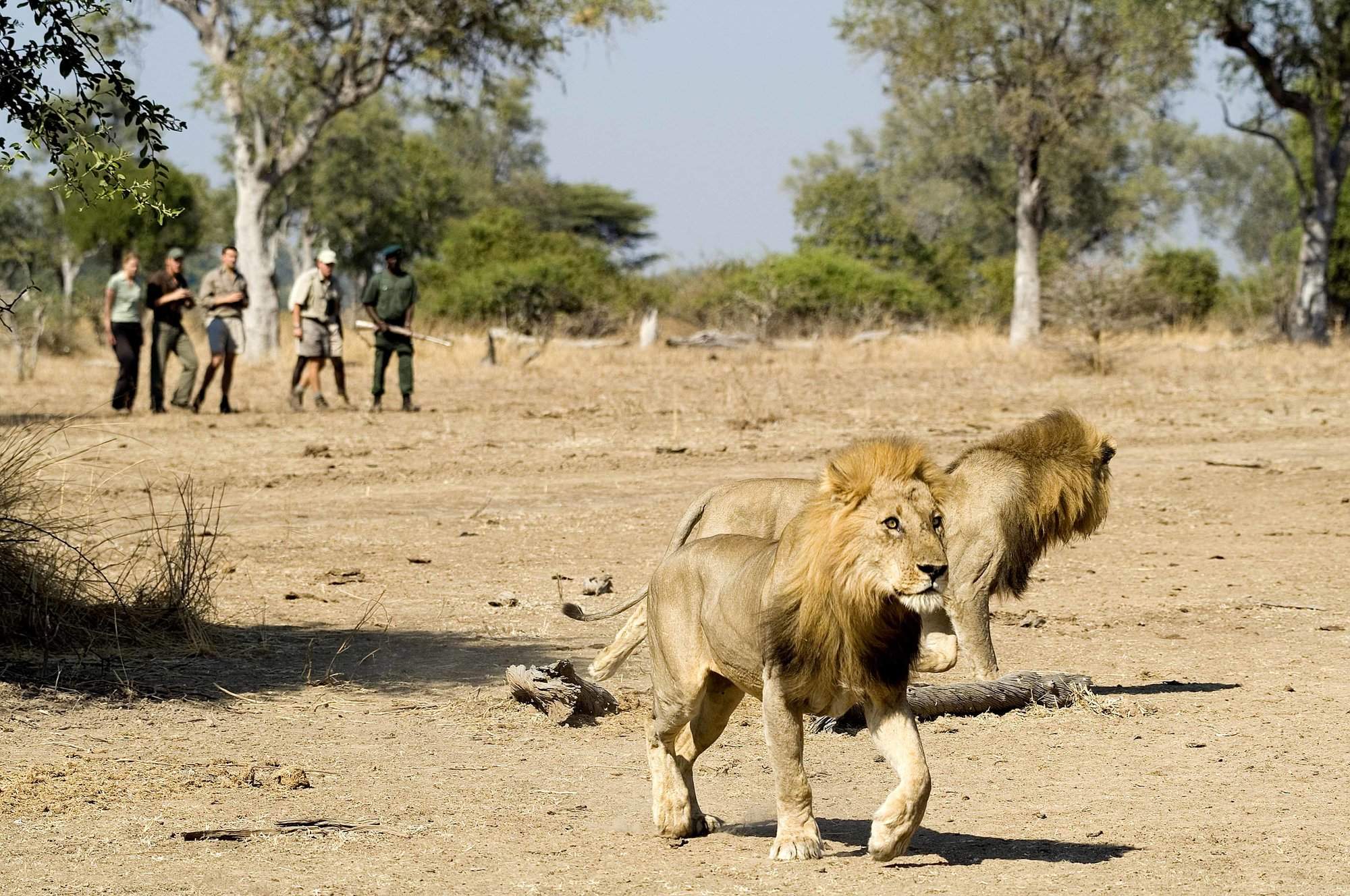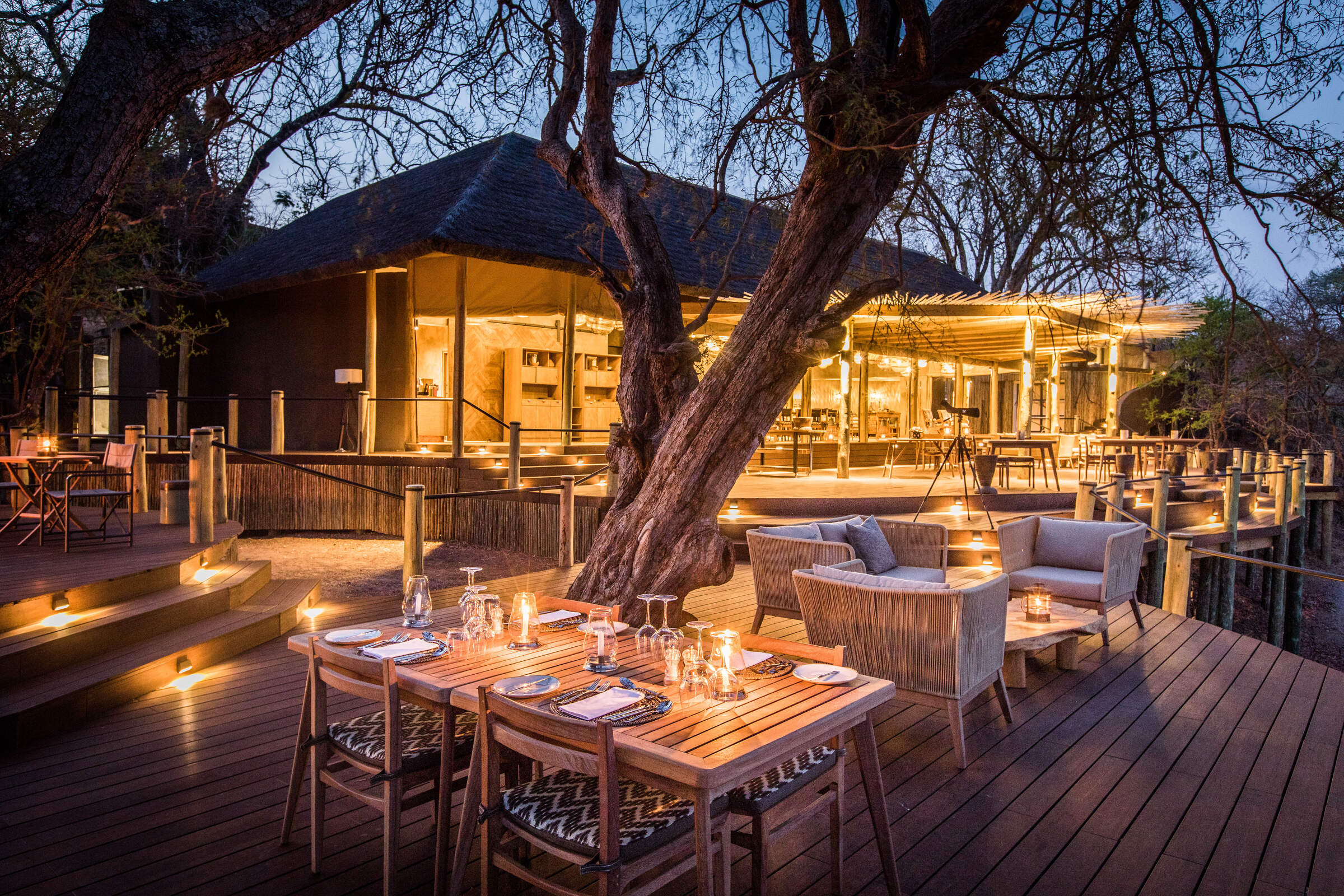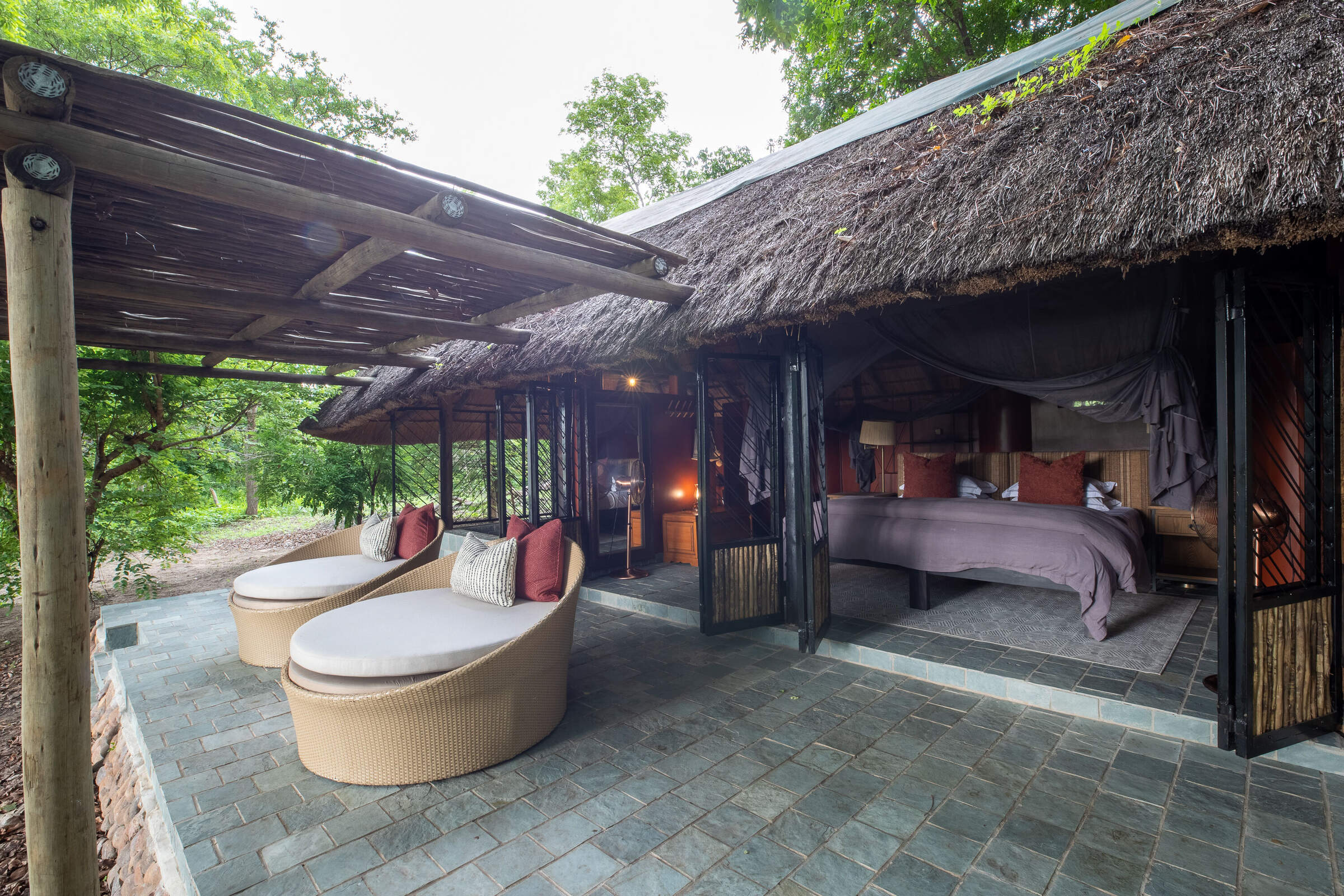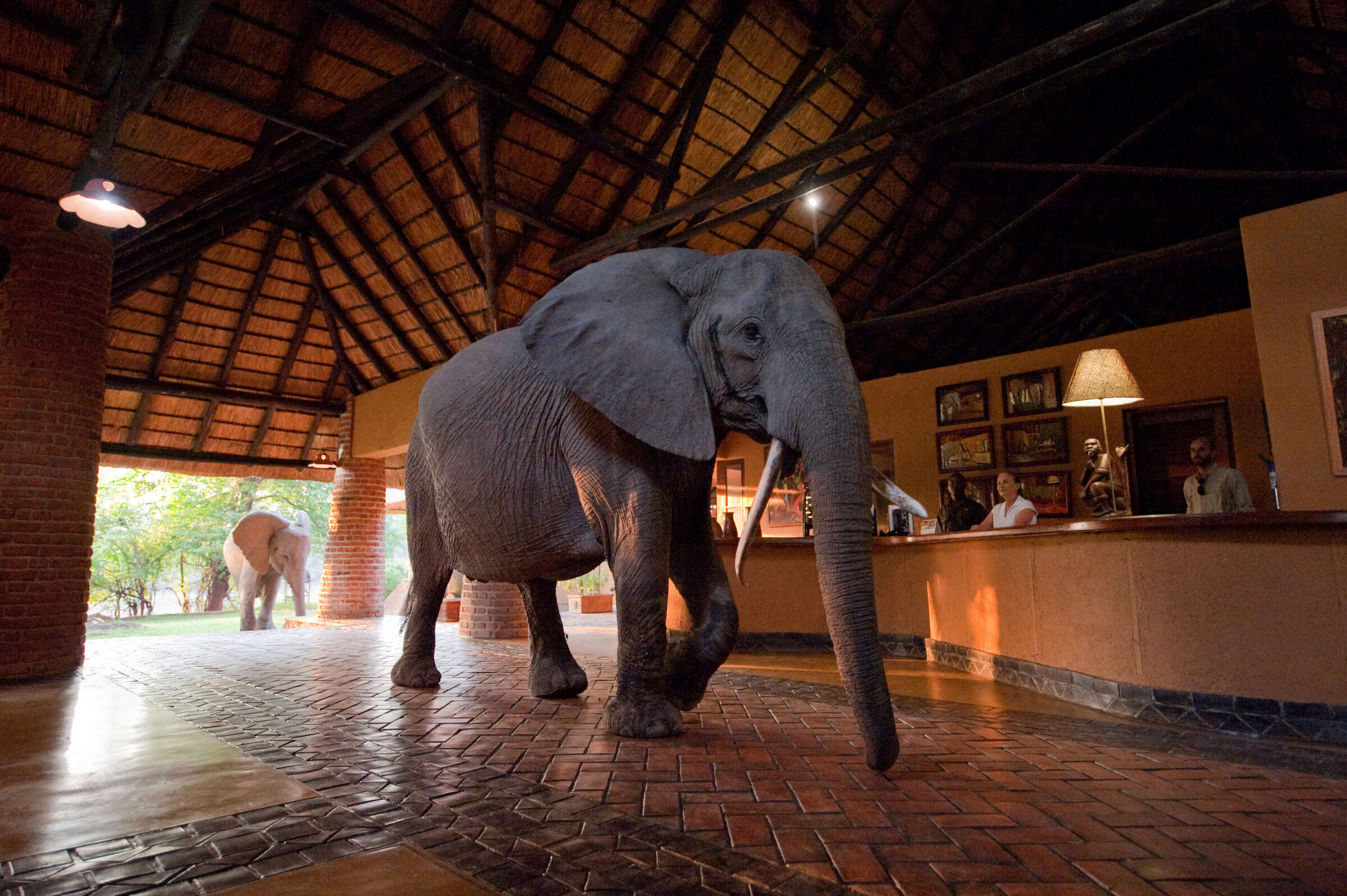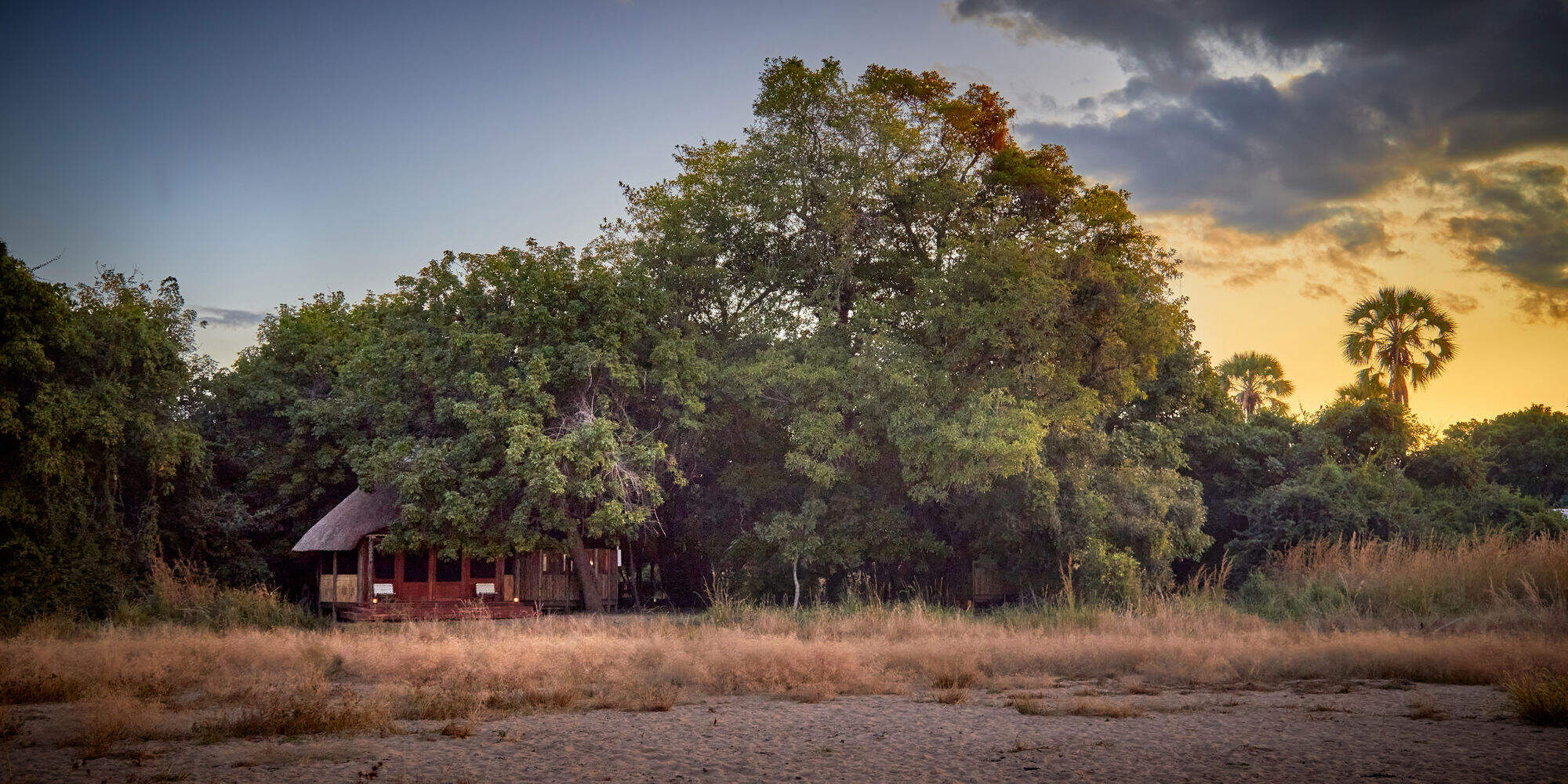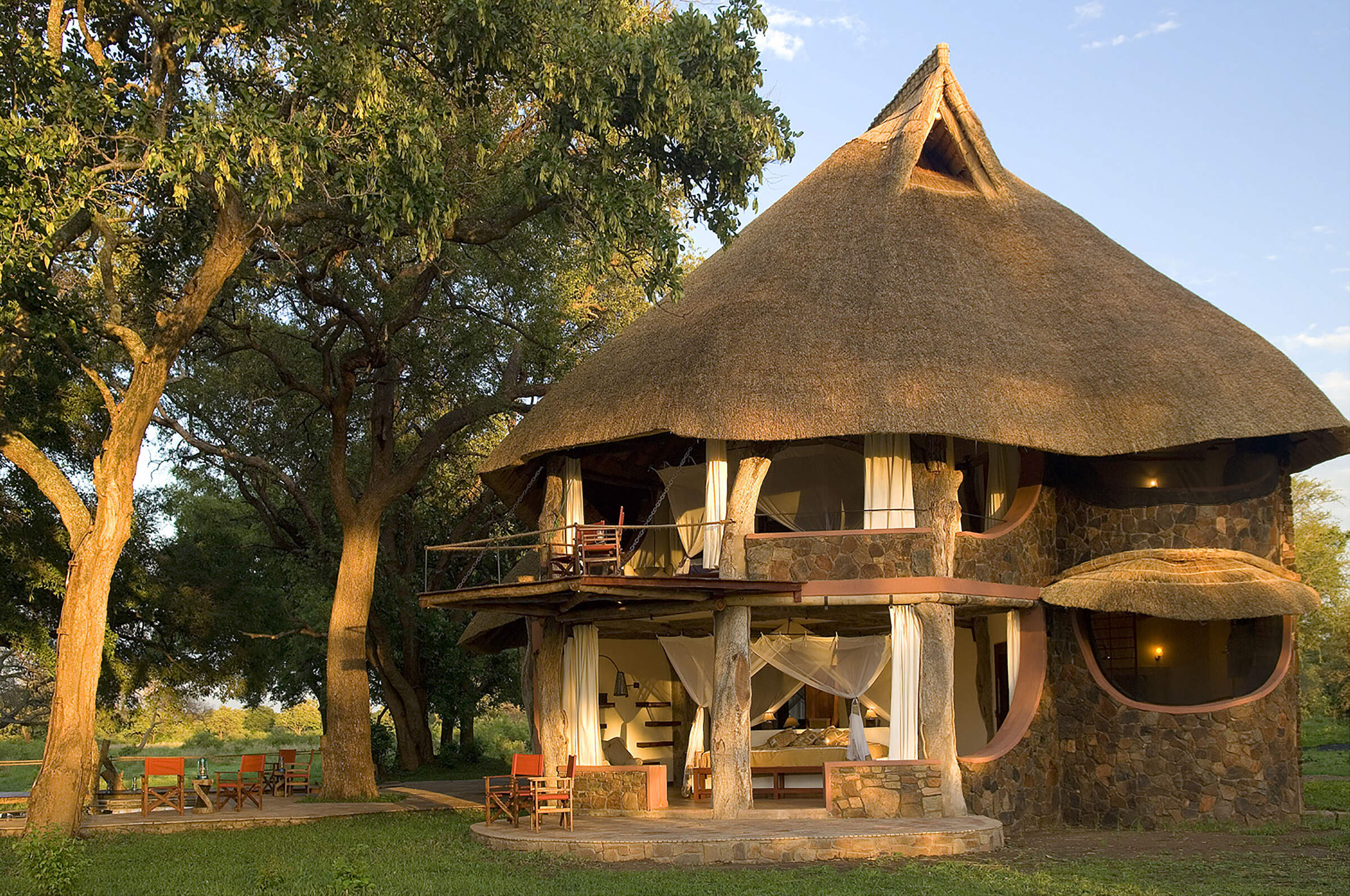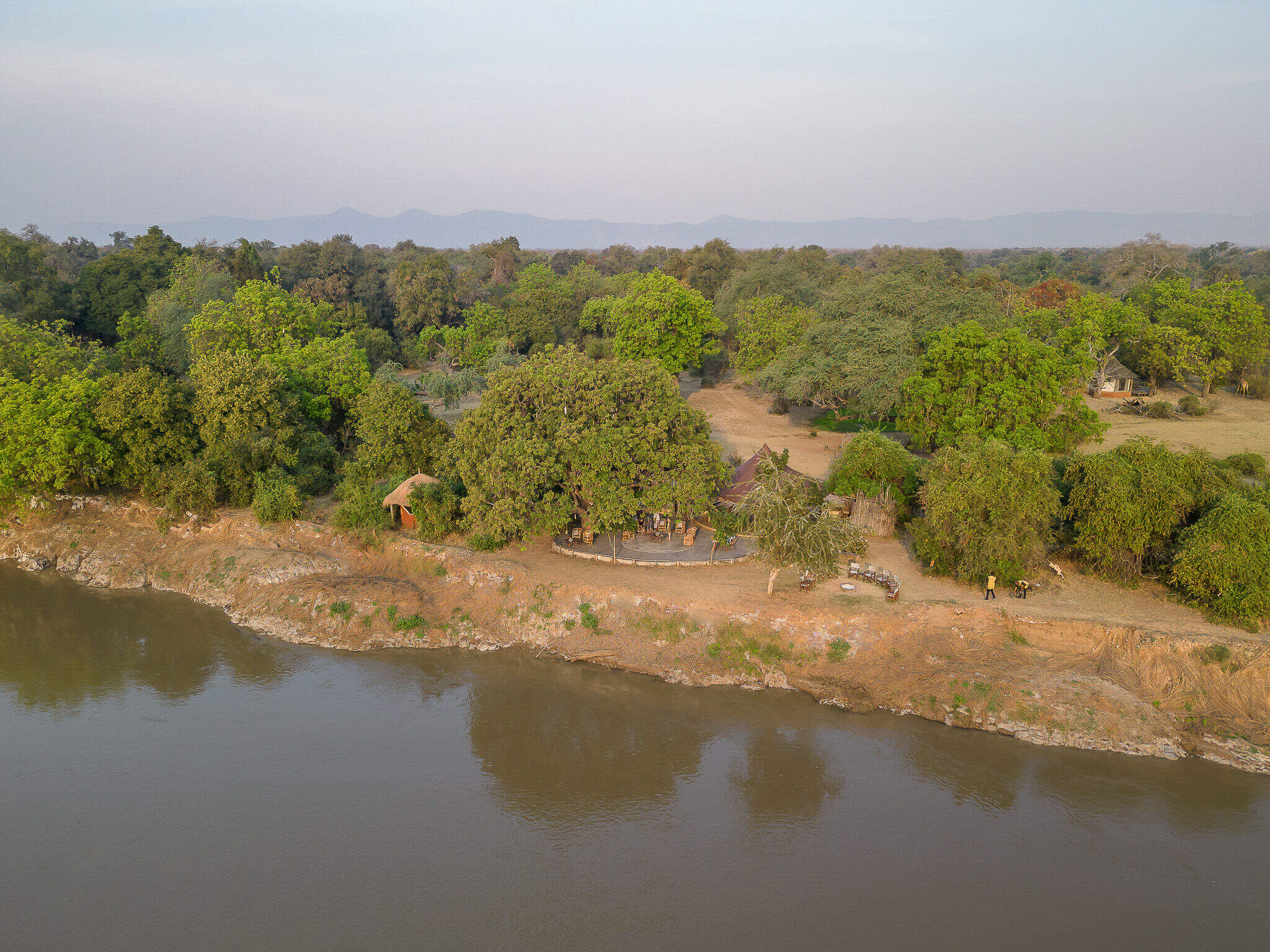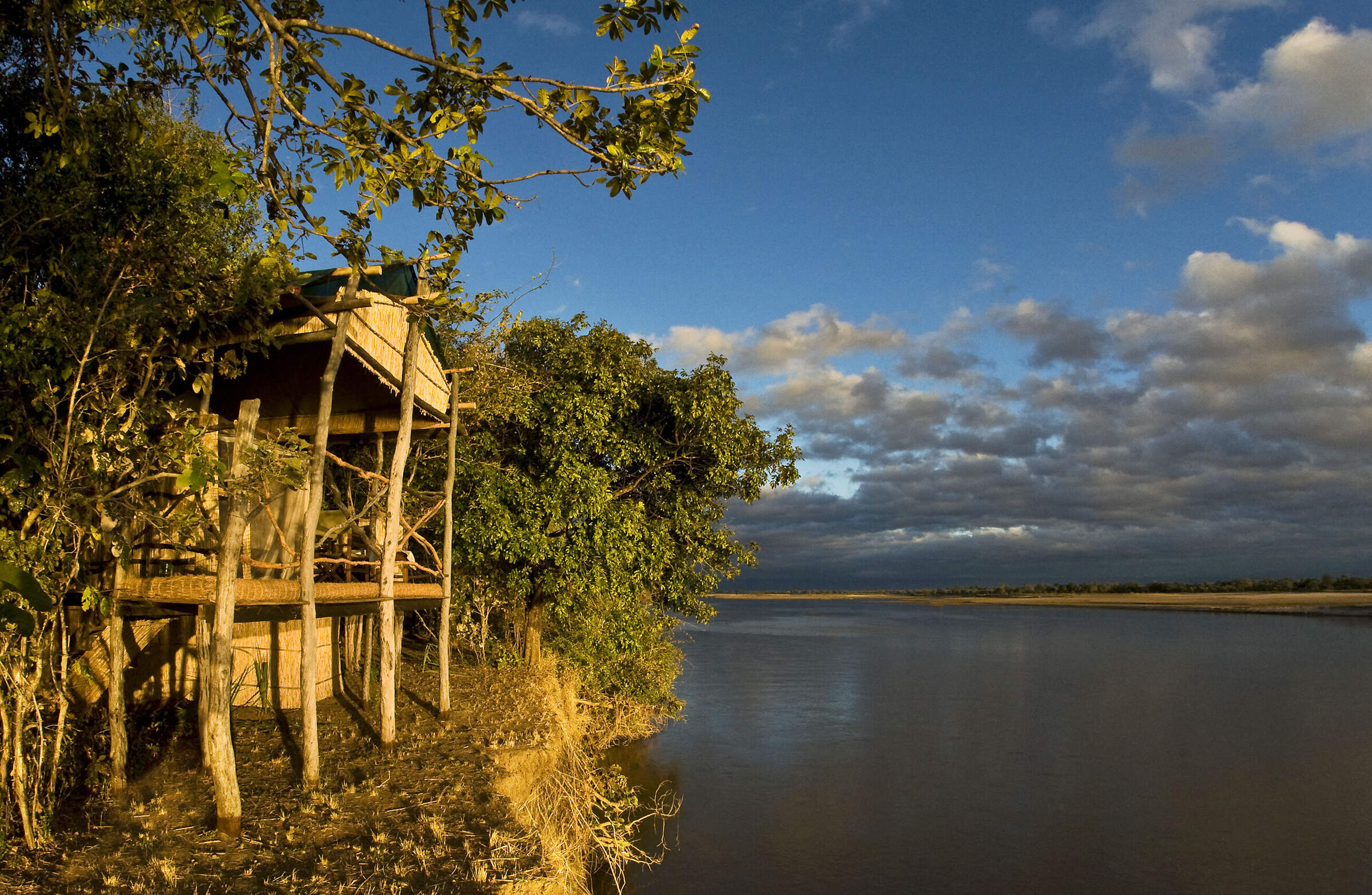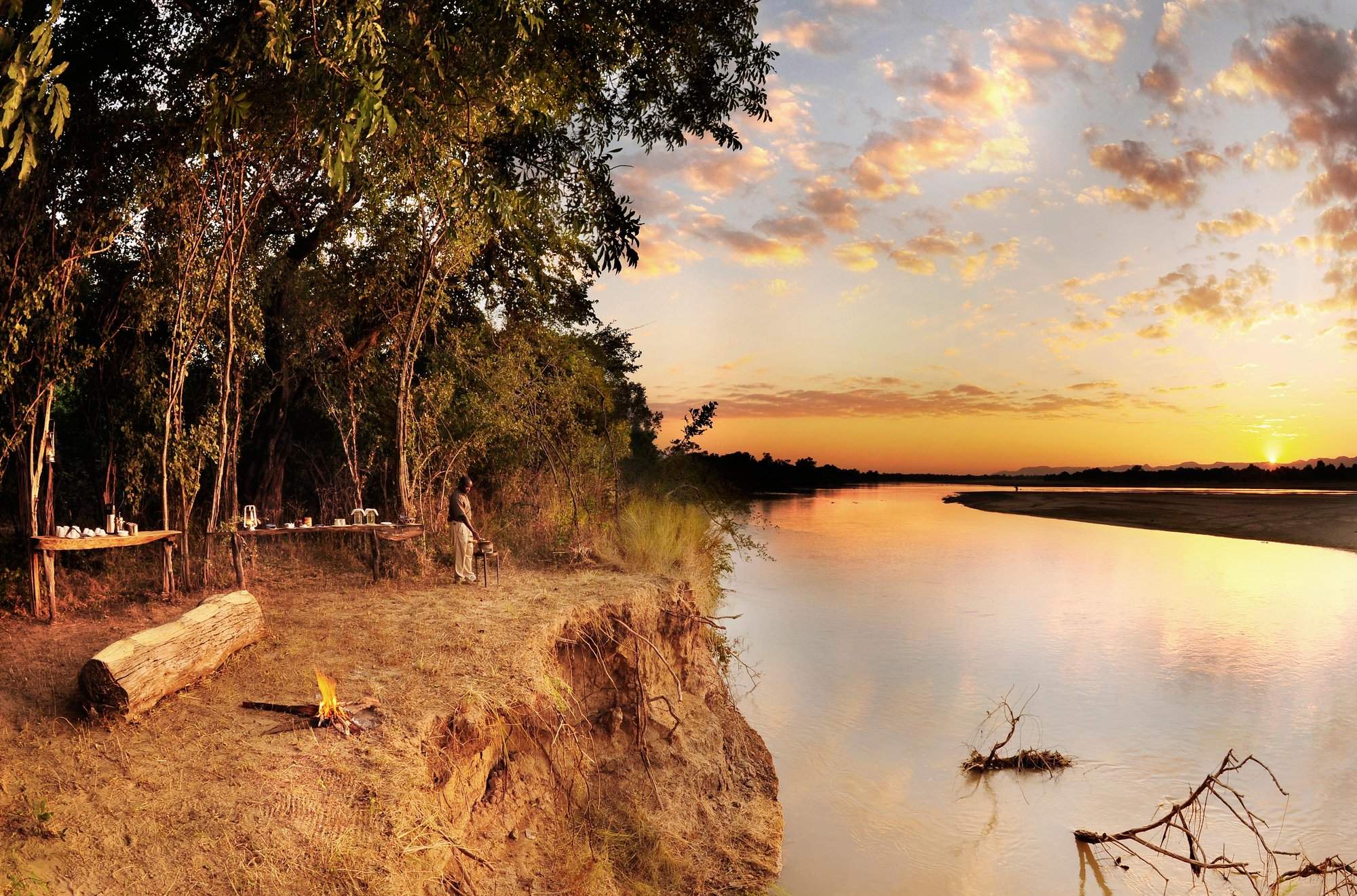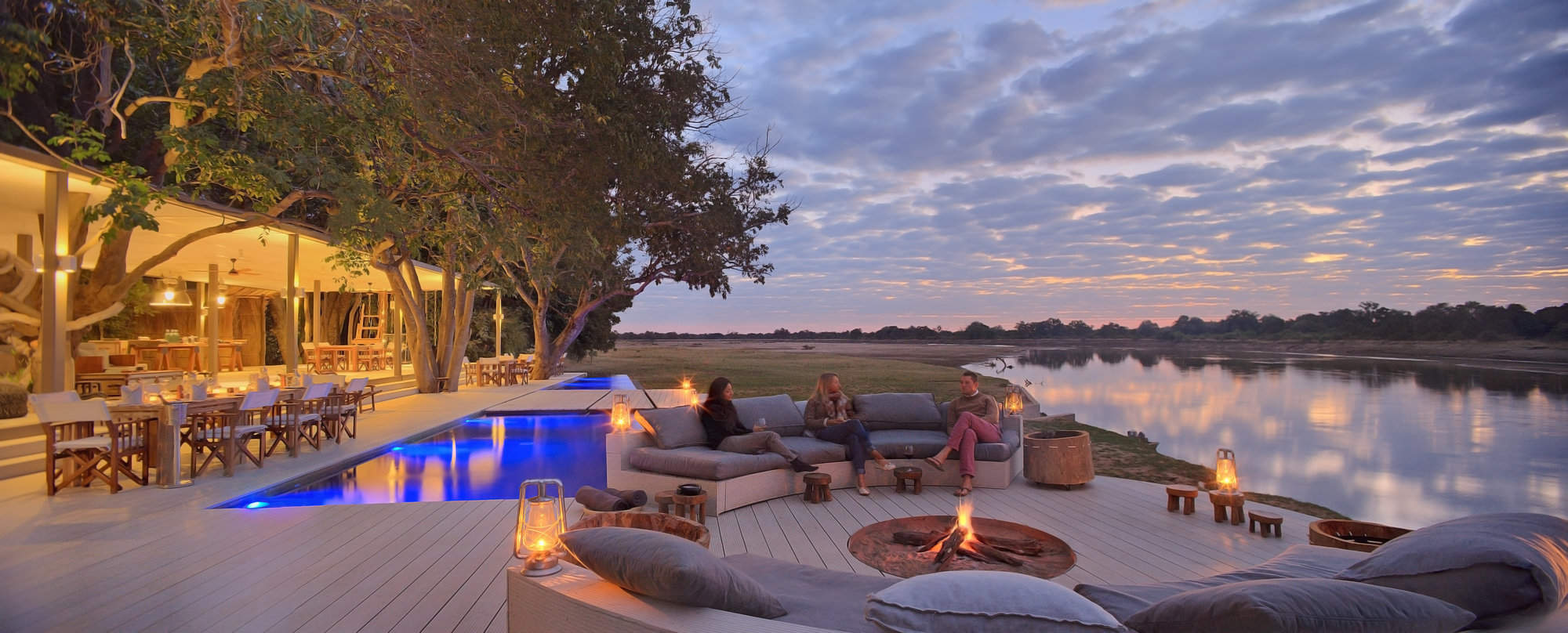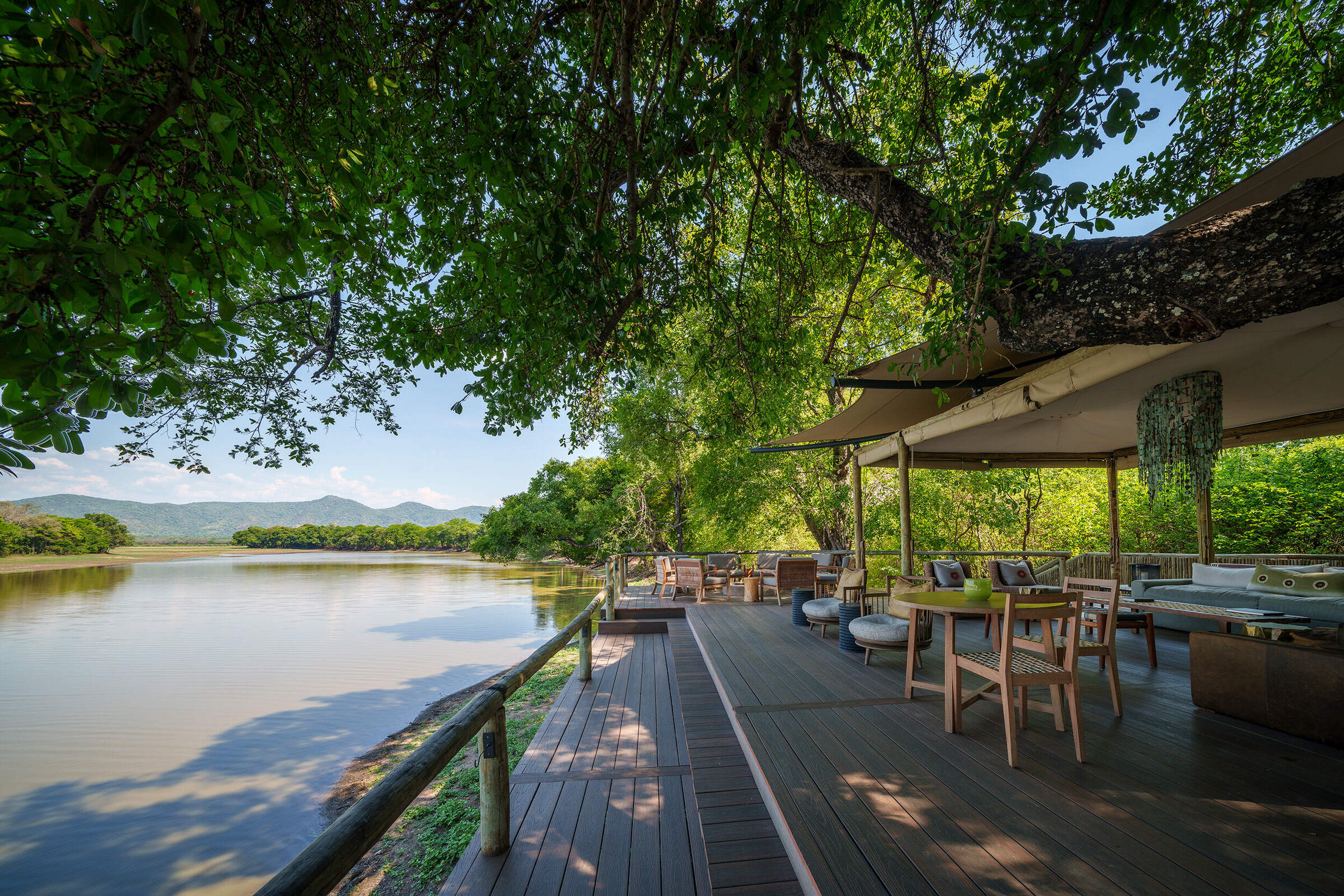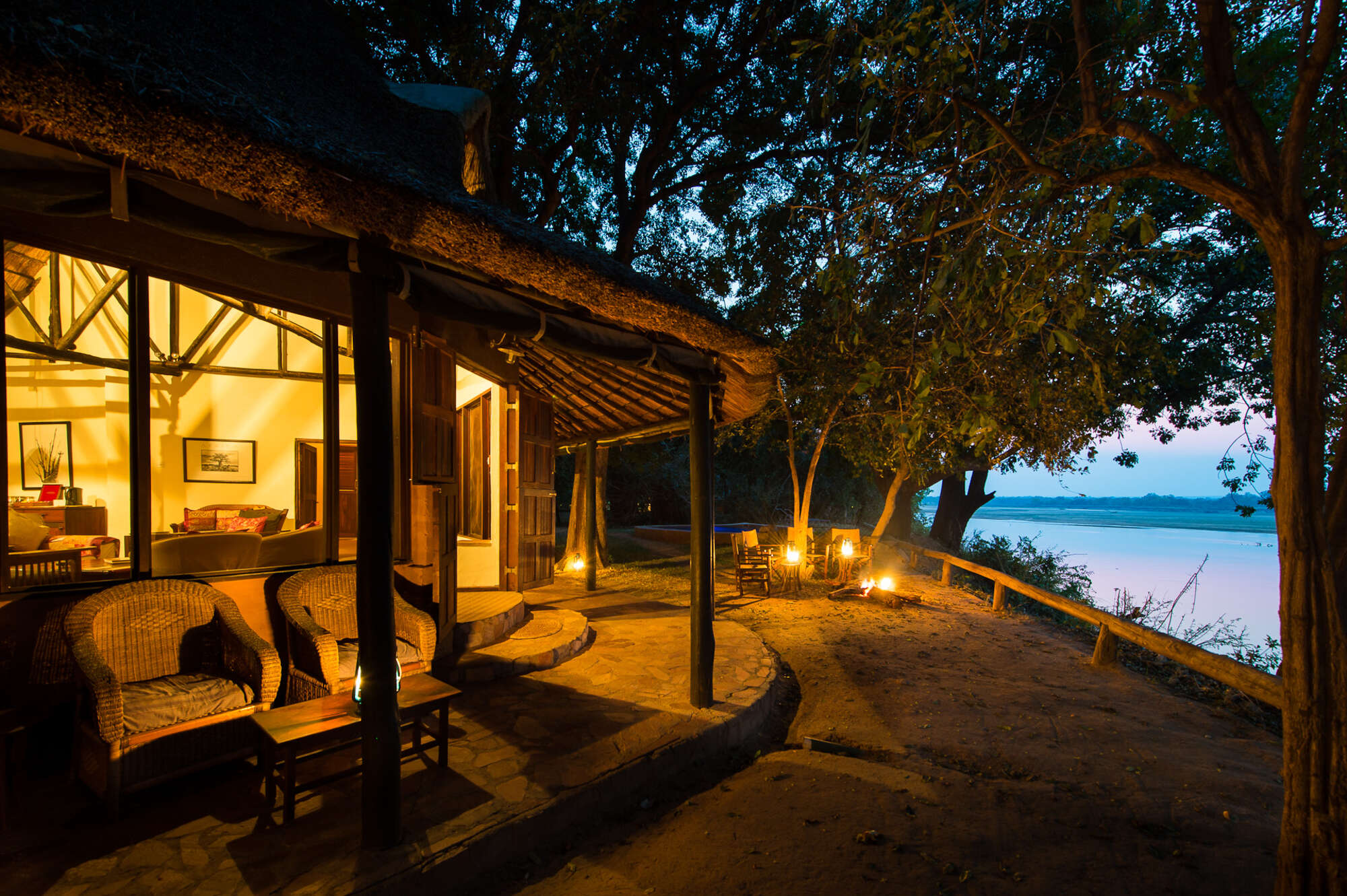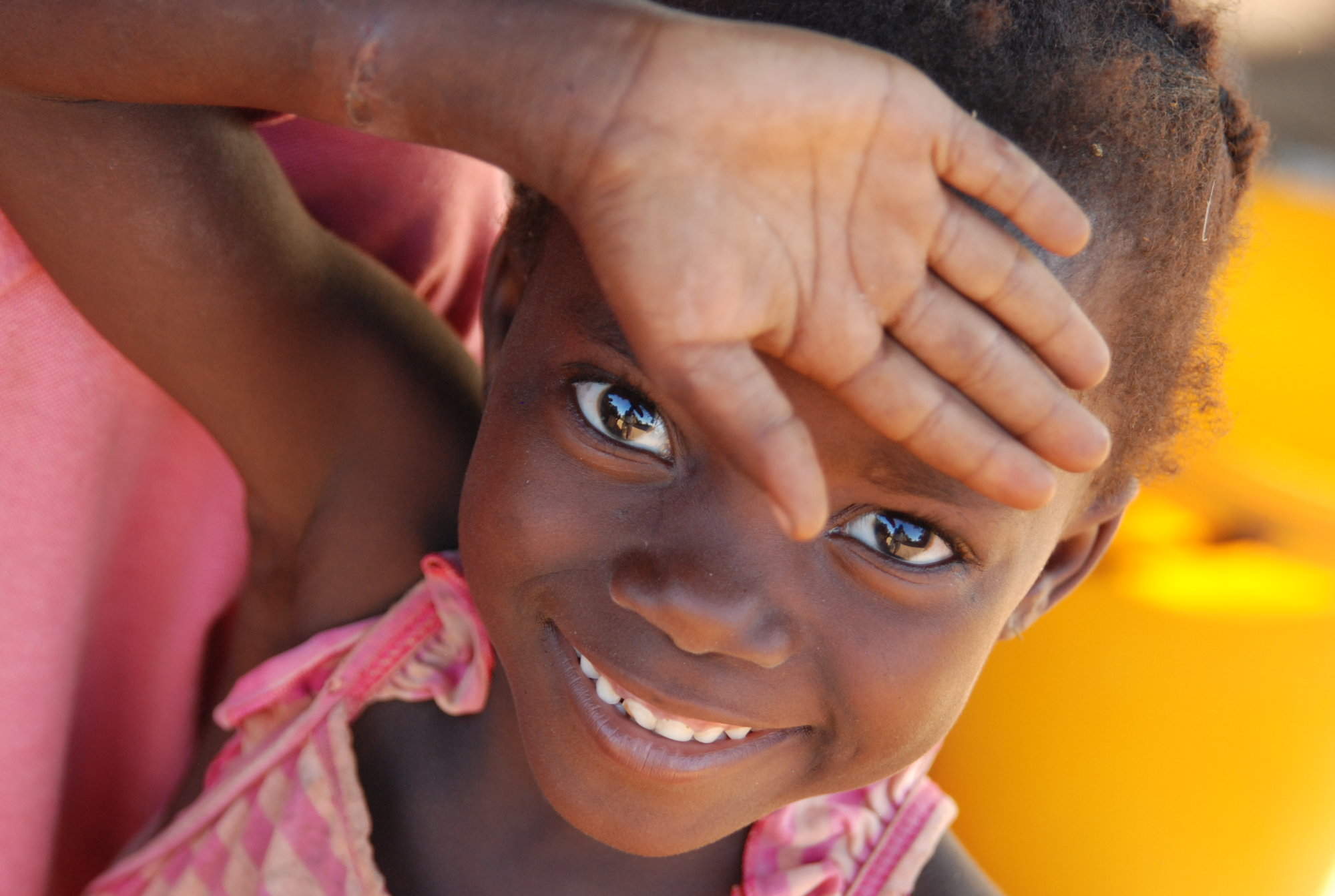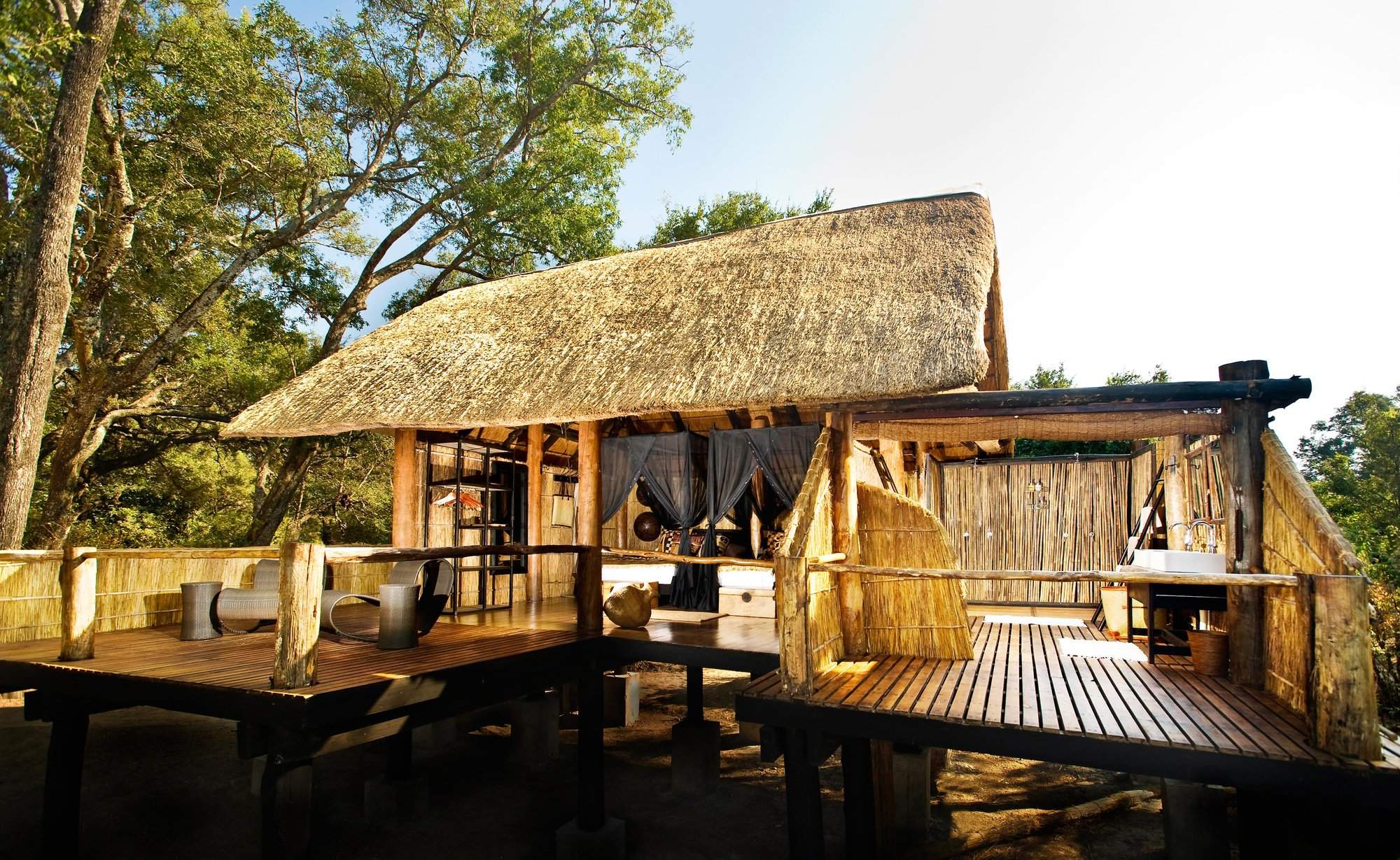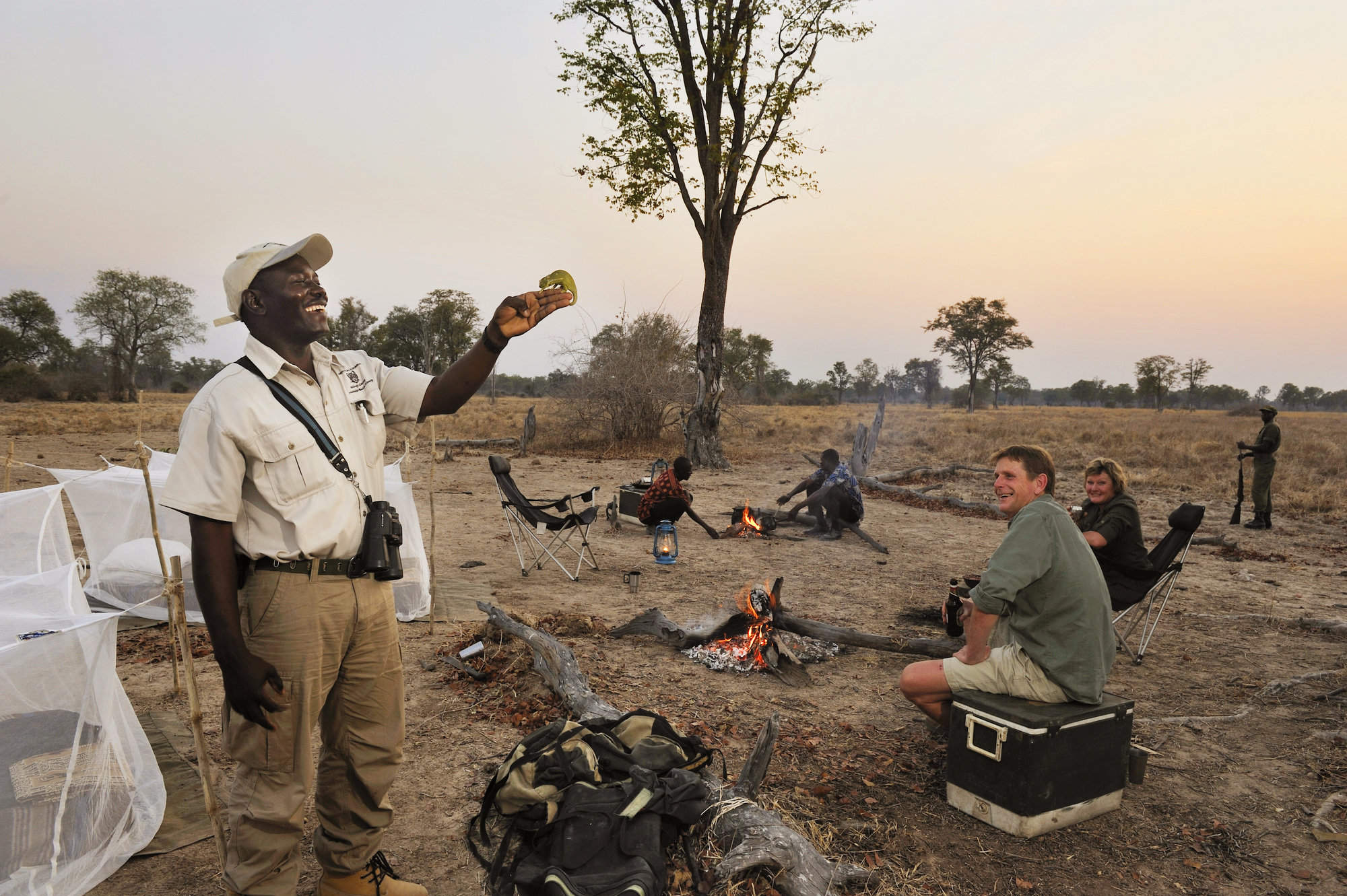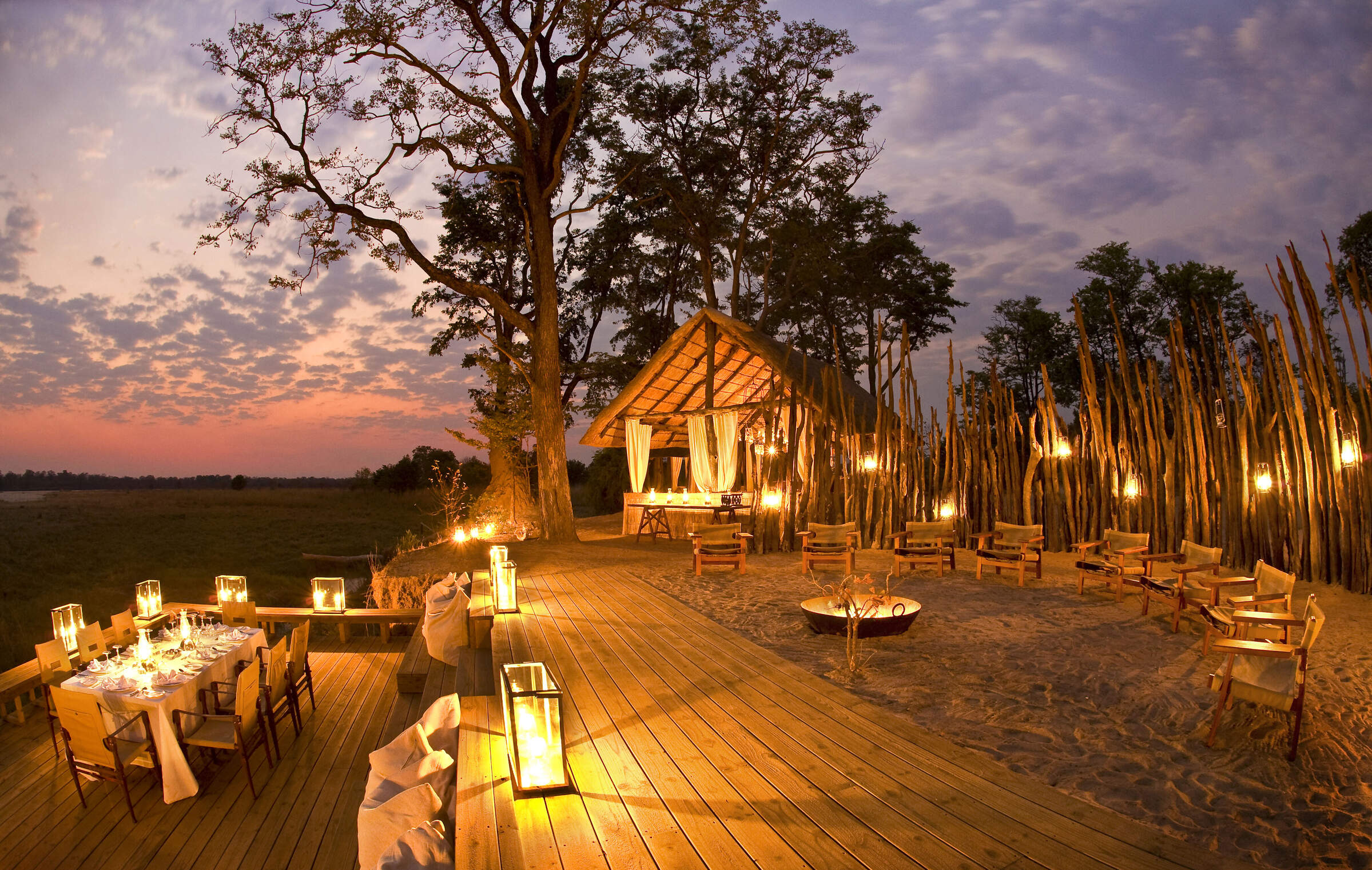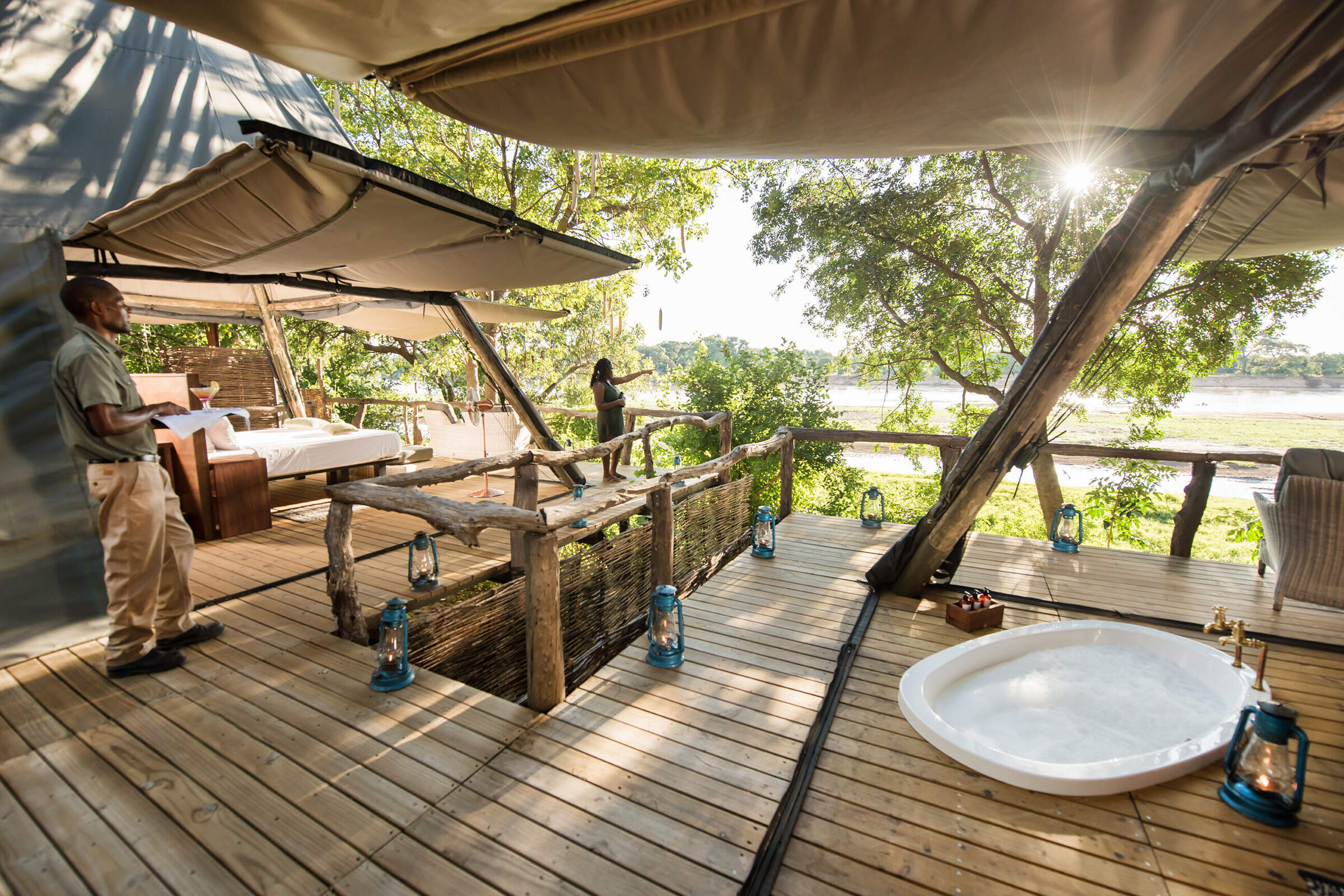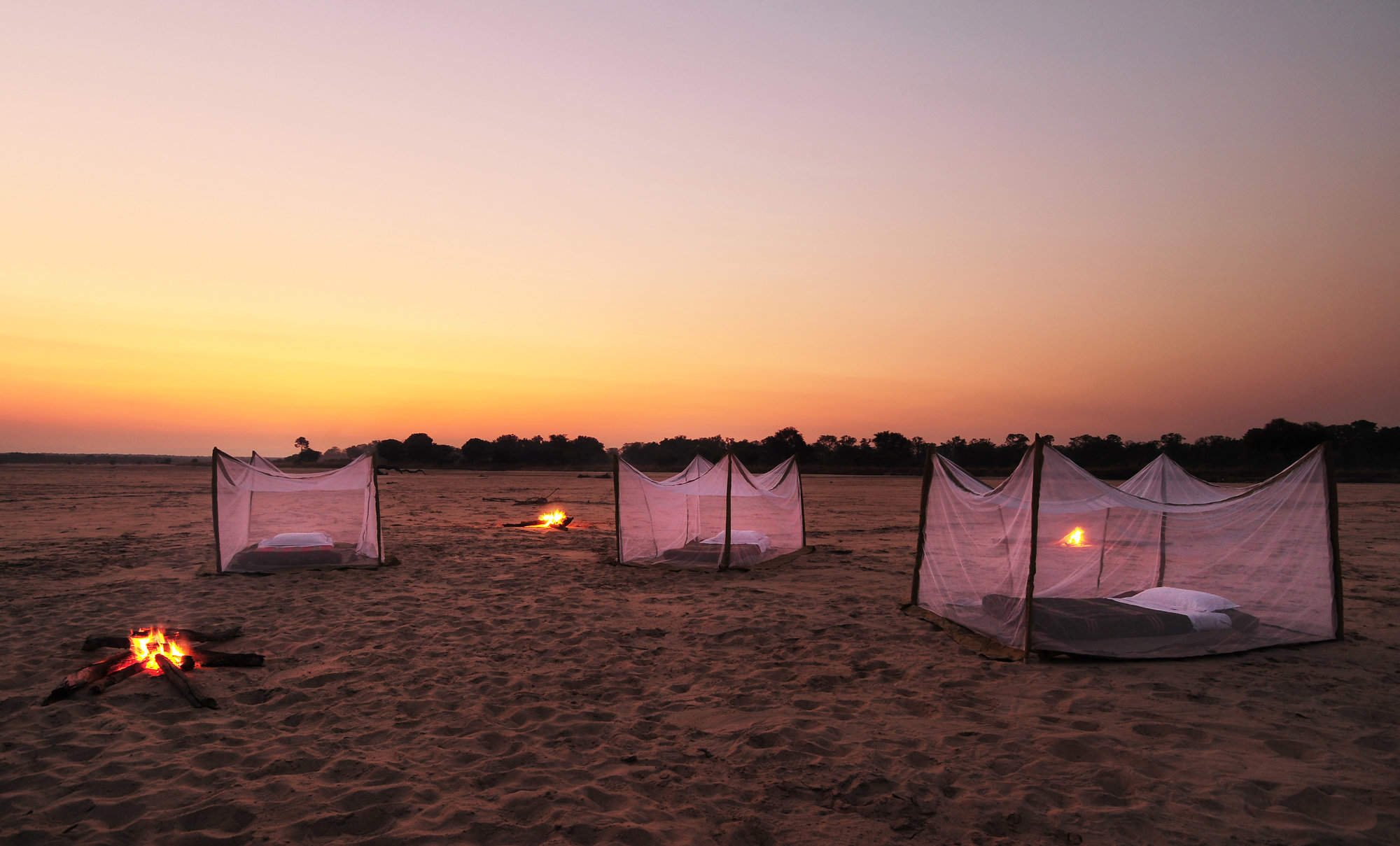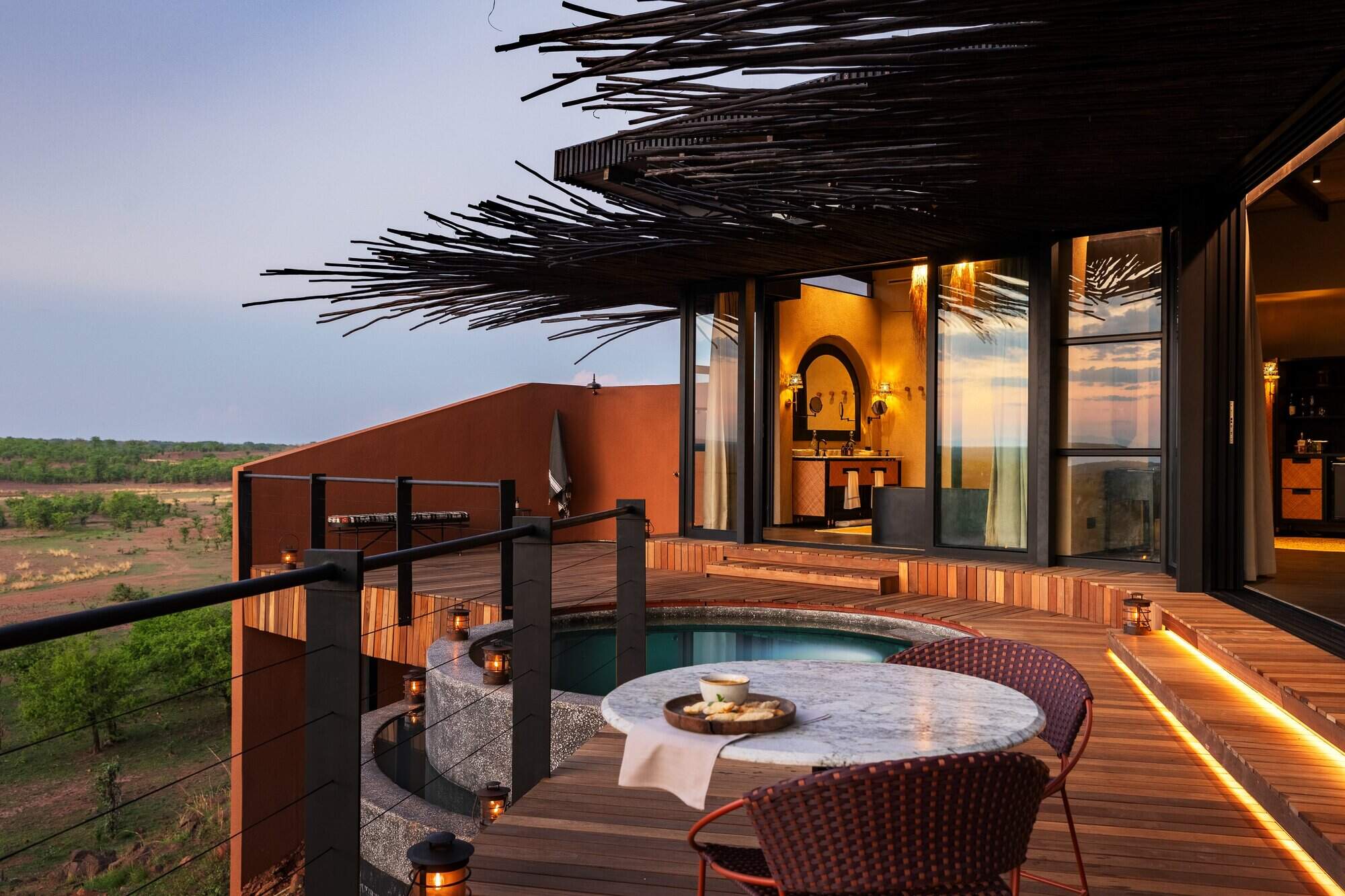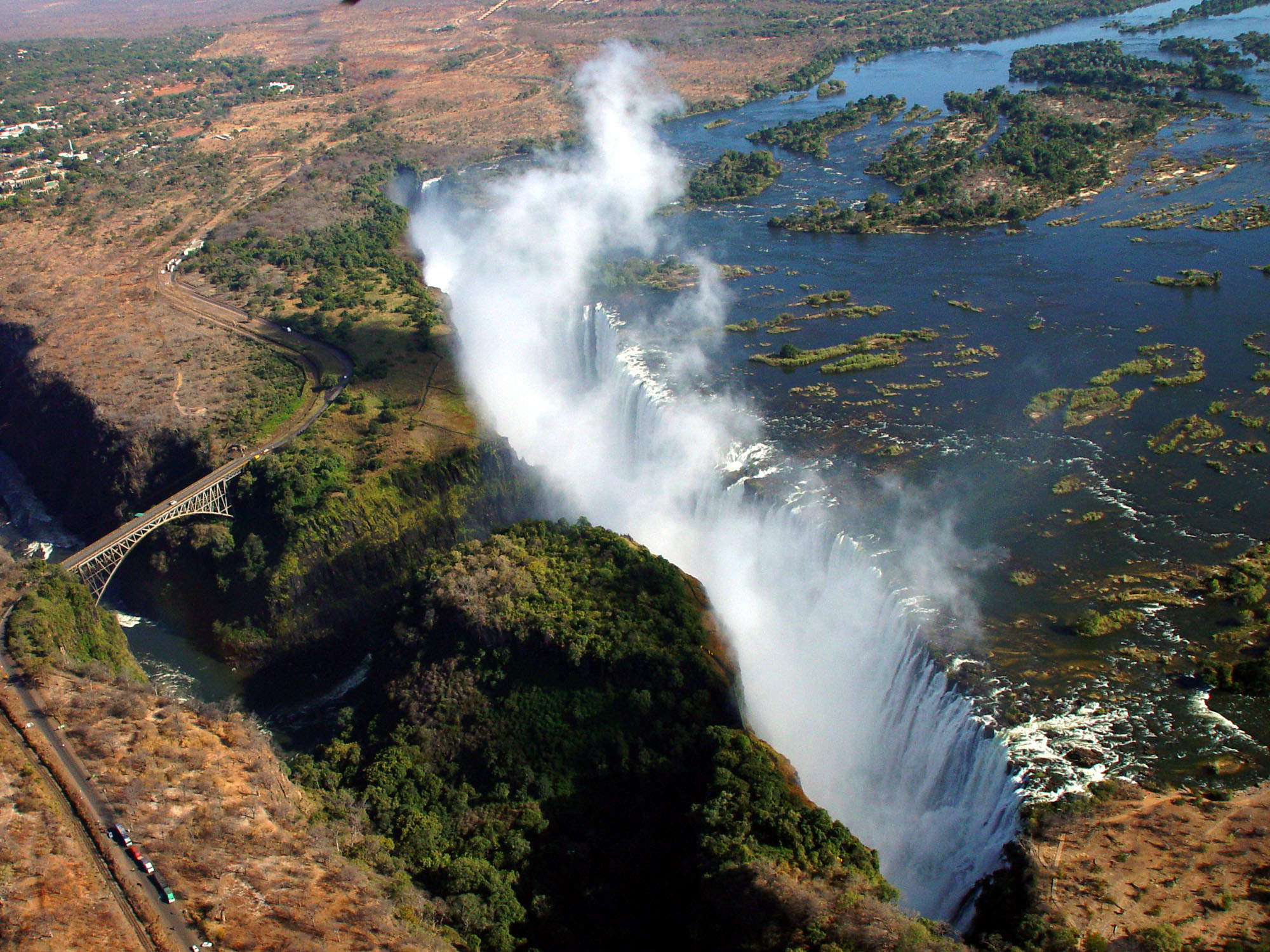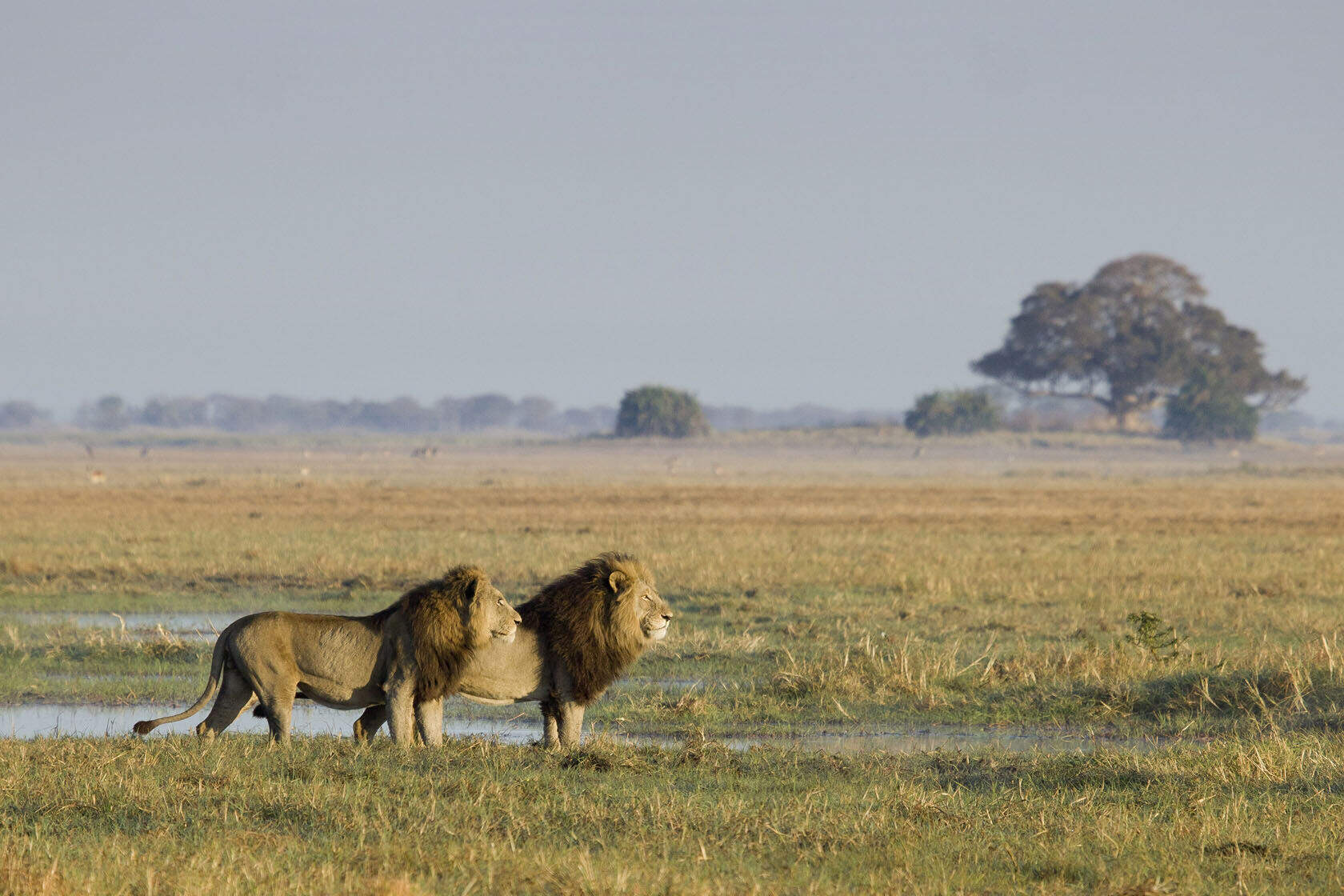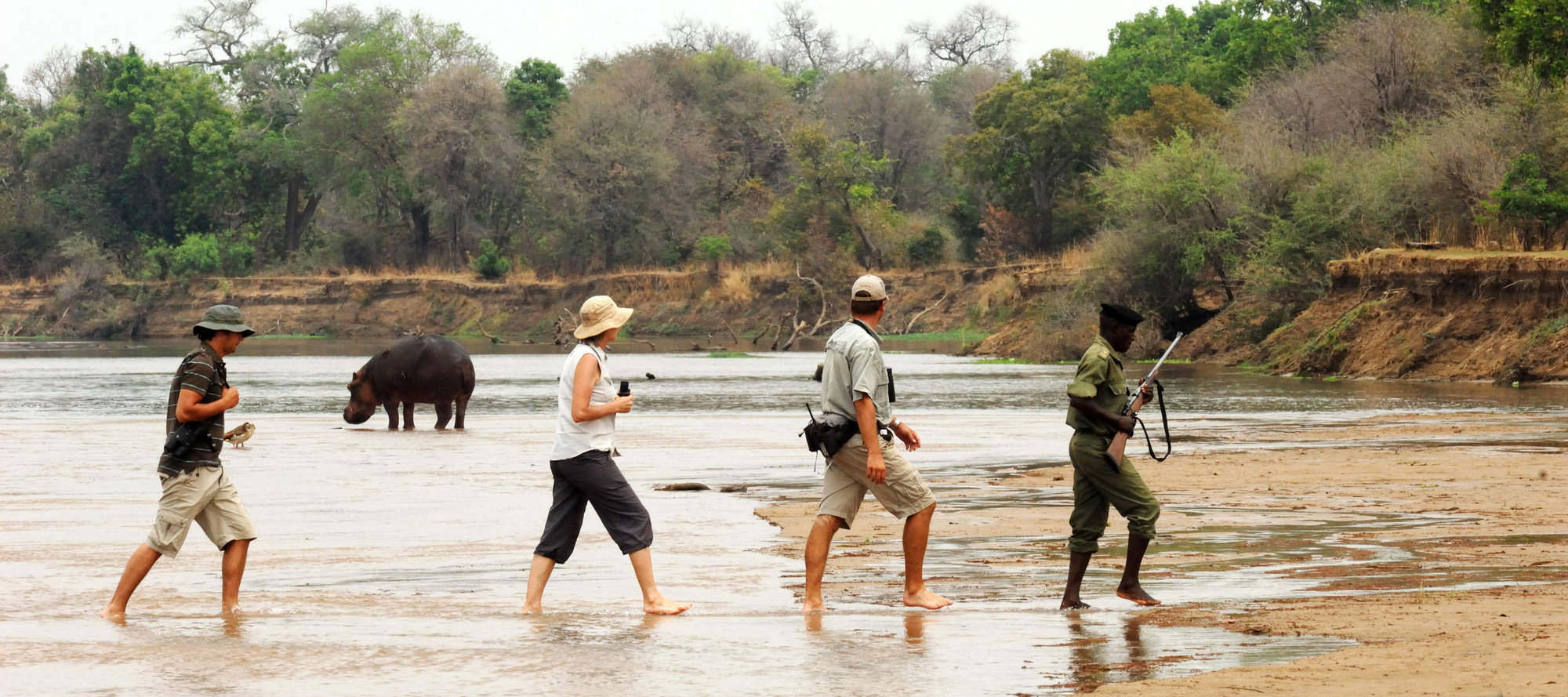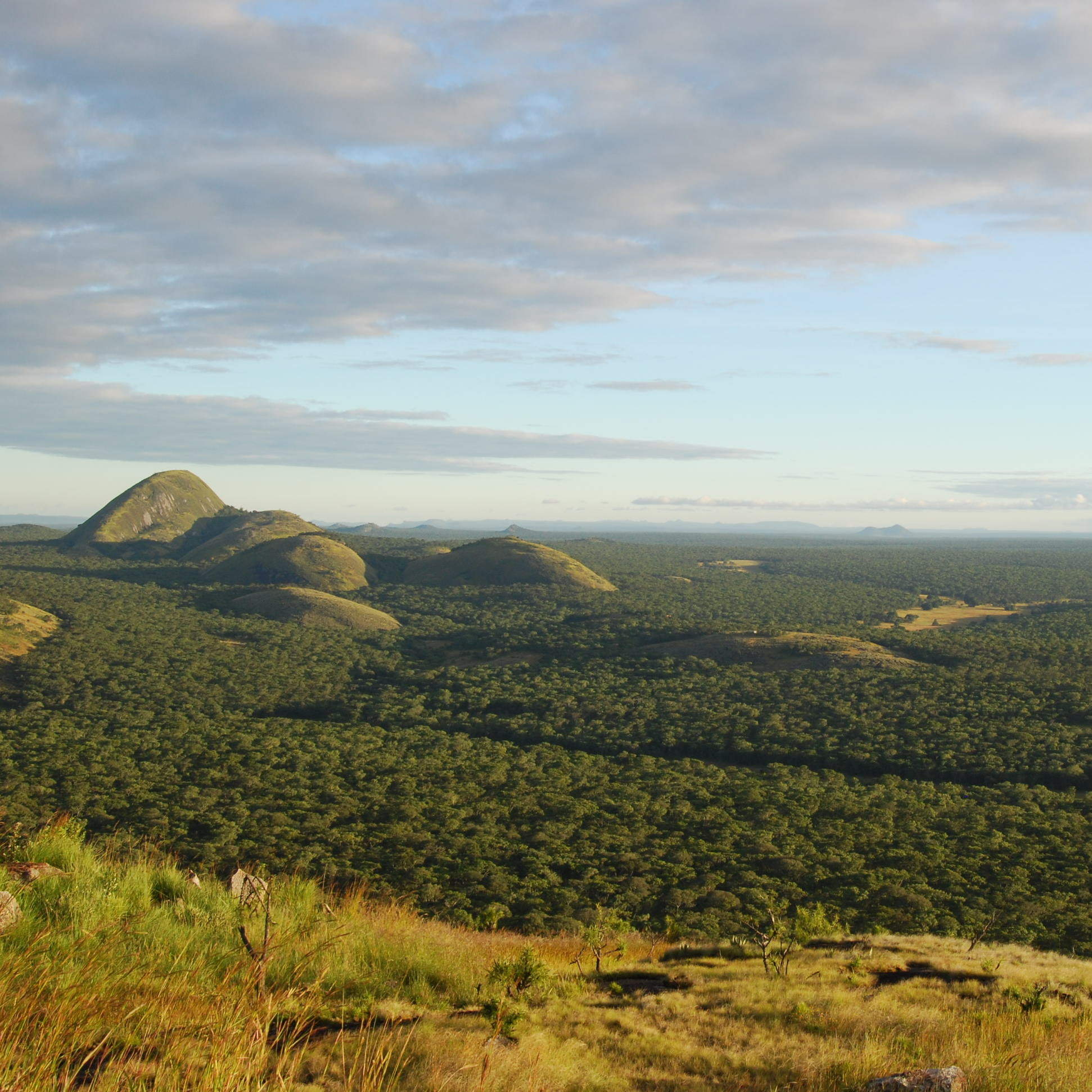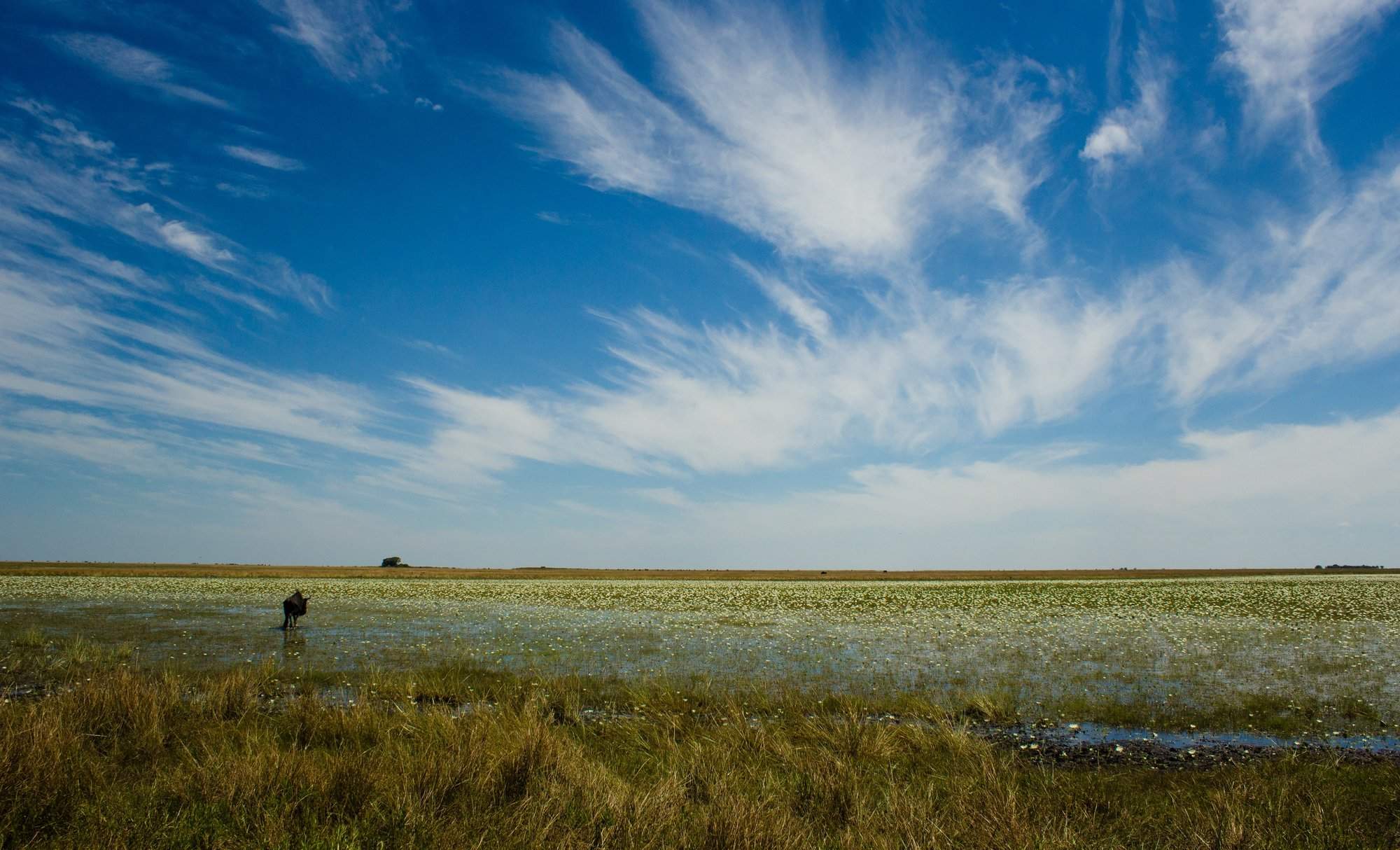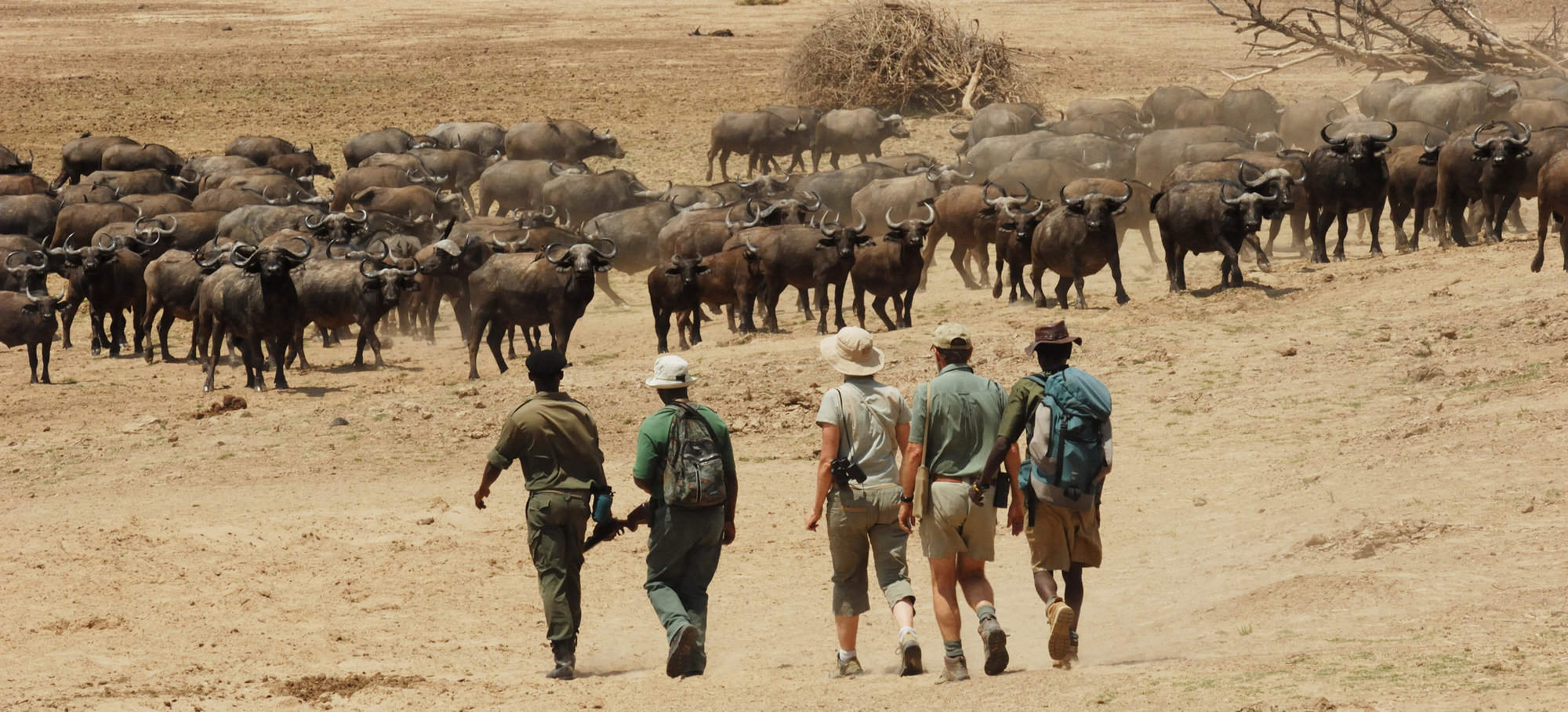Luwi Bushcamp: Our full report
Luwi Bush Camp is Norman Carr Safaris' most remote and rustic camp, with no other camps, or people, for miles.
It stands in a small grove of mahogany trees, and has great views over a floodplain to the Luwi riverbed beyond. Although the camp is away from the main Luangwa River, there are two permanent lagoons here, each with an impressive population of hippo and crocodile.Luwi is an intimate bushcamp with just five en-suite chalets of grass and thatch, tucked amongst the trees. Although each is slightly different, all are rustic but functional and comfortable, with twin or double beds under a large walk-in mosquito net and reed mats on the solid earth floors. The furniture is very rustic, too, with just a hanging rail and a shelf for your luggage, simply made from local wood and reeds.
The en-suite bathrooms are completely open to the sky and are very spacious. Showers have hot and cold running water, available all day, and there's a flushing toilet. There's no electricity at Luwi, but solar lanterns provide light in the bedroom and bathroom.
The honeymoon chalet is set a little away from the other three, and is slightly larger. Rather cleverly, its front wall swings open to create a private patio area and a completely open view from the bed out over the plain. Private meals can be arranged on the patio on request.
Luwi Bush Camp has a small open-sided main area, or 'chitenje', with a thatched roof and a sand floor. This houses the bar and a small reference library, with a few directors' chairs, but all other communal areas are spread around under the trees. A seating area surrounds the campfire and overlooks the floodplain, and another, with comfortable chairs around a table, is set up under shady trees. During the day, meals are usually taken in a shady spot near the bar, but come nightfall, a candlelit dinner may be set up overlooking the floodplain or perhaps even in the riverbed.
A short distance from camp there is a hippo hide overlooking one of the lagoons, which is a great quiet spot to spend the afternoon with a cold drink, waiting for the wildlife to come to you!
For an additional supplement guests can sleep out in the dry Luwi riverbed during the later months of the year. You’ll sleep on a surprisingly comfortable bedroll under a small portable mosquito net within a ring of bonfires and armed guards to keep larger animals away. As you watch the Milky Way progress across the crystal-clear night sky, it’s a magical way to get a true feel of the bush.
As Luwi normally has only one guide in camp, activities are agreed and done as a group. The emphasis is firmly on walking, with a guide and an armed scout, exploring a variety of habitats that include open floodplains, dry riverbeds, mopane woodland and the two lagoons. This is a good area of the park to search for the elusive roan antelope, eland and hartebeest which are almost never seen in other parts of the South Luangwa. On a previous visit we were fortunate enough to spot a small herd of roan antelope not too far from the road.
There are usually two walks a day, one in the morning and one in the afternoon. While the camp has a vehicle for spot-=lit night drives (yielding some impressive wildlife sightings on previous visits), there are few roads in the area so more ground can be explored on foot. One highlight is to walk the 7km between Luwi and its sister bushcamp, Nsolo. On one of our visits, we were lucky enough to spot a herd of eland along this route; our guide was very excited as he got us closer to them than he'd ever been to eland on foot!
The area around Luwi is very isolated, with no other camps in the vicinity. That’s usually a bonus, but in May/June, when the camp re-opens after the wet season, the wildlife can be a bit skittish, having seen no vehicles or people for six months. Conversely, the lagoons are a big draw for game in the dry months (July to October), and the Expert Africa team has had some exceptional sightings over the years, including lion in the riverbed, and a leopard stalking and killing a bushbuck.
Our view
Luwi is a rustic, remote yet comfortable bushcamp built completely of natural materials with minimal impact on the environment. Although the focus is on walking safaris, concentrating on the sounds, smells and smaller wildlife that you can so easily miss from a vehicle, if you spend a few nights here you are likely to see larger game too.
Geographics
- Location
- South Luangwa National Park, Zambia
- Ideal length of stay
- We usually recommend two or three nights at Luwi Bushcamp as part of a longer safari combining some of its sister bushcamps: Kakuli Bushcamp, Mchenja Bushcamp and Nsolo Bushcamp, often starting or ending at the luxurious Chinzombo.
- Directions
- A 70-minute flight from Lusaka to Mfuwe is followed by a road transfer/game drive of approximately three hours to Luwi Bush Camp.
- Accessible by
- Fly-and-Transfer
Food & drink
- Usual board basis
- Full Board & Activities
- Food quality
- Members of the Expert Africa team have visited Luwi Bushcamp many times in the last decade, most recently in September 2017. Whilst we didn't get the chance to stay for a meal on this trip, on our previous visits here we have found the meals at Luwi and its sister camps to be particularly delicious, well prepared and well presented.
Breakfast is usually served around the campfire before your early- morning walk. As well as a buffet with a good choice of cereals and juices, there'll be porridge, toast, tea and coffee prepared over the fire.
A buffet brunch is laid out under the shade of a tree at about 11.30am, after the morning activity. We've previously enjoyed babootie (a warm lightly curried South African dish), vegetable quiche, beetroot and mozzarella salad and a green salad, followed by fruit salad.
Before heading out on your afternoon activity, you'll be served afternoon tea with a delicious freshly baked cake.
Dinner is usually a three-course meal, set up by candlelight under the stars. On one trip we were treated to a barbecue in the dry riverbed, lit by lanterns and candles. We started with butternut soup, which was followed by barbecued chicken, sausages, lamb steaks and vegetable kebabs, accompanied by coleslaw and a green salad. For dessert there was a very tasty sticky toffee pudding. - Dining style
- Group Meals
- Dining locations
- Indoor and Outdoor Dining
- Further dining info, including room service
- None.
- Drinks included
- Soft drinks, house wine and local spirits are included in the rates, but fine wines, champagne and imported spirits and liqueurs are charged as extras.
The tap water is filtered and suitable for drinking, but bottled water is also readily available from the bar if you prefer.
Special interests
- Solo Travel
- Fantastic walking safaris, group dining and special wildlife hide at Luwi Bushcamp create a personal and intimate atmosphere. The camp is very remote and rustic, and charmingly appealing to solo travellers in Zambia. Ask us if we can waive the single supplement.
- See ideas for Solo Travel in Zambia
- Walking safaris
- Luwi Bushcamp is in an established walking area that offers a variety of habitats. These include two permanent lagoons, which are home to large numbers of hippos and crocs and attract a variety of other wildlife. Visit as part of a camp-to-camp walking safari.
- See ideas for Walking safaris in Zambia
Children
- Attitude towards children
- Luwi is happy to accommodate children of 12 years and over.
- Property’s age restrictions
- Children aged 12 years and over are welcome at Luwi.
- Special activities & services
- None
- Equipment
- None
- Generally recommended for children
- Luwi is a remote bushcamp with quite an adult atmosphere so is suited only to older children with a high degree of maturity.
- Notes
- Children will need to be constantly supervised by their parents as the camp is not fenced in and game wanders freely throughout.
Our travellers’ wildlife sightings from Luwi Bushcamp
Since mid-2018, many of our travellers who stayed at Luwi Bushcamp have kindly recorded their wildlife sightings and shared them with us. The results are below. Click an animal to see more, and here to see more on our methodology.

100% success

100% success

100% success

100% success

50% success

0% success

0% success

0% success

0% success

0% success

0% success

0% success

0% success

0% success

0% success
Communications
- Power supply notes
- There are no charging facilities in the chalets, but items can be charged in the communal main area. Note, however, that you may have to leave your electronics unsupervised.
- Communications
- Luwi Bush Camp has 24-hour radio communication with its sister camps in South Luangwa National Park and with its base at Kapani Lodge.
- TV & radio
- Luwi has no TV or radio.
- Water supply
- Borehole
- Water supply notes
- All of the rooms have flushing toilets, and washbasins and showers with plumbed hot and cold water.
Sustainability

Traditional design using natural material
As part of Norman Carr Safaris, the pioneer of conservation-based tourism in Zambia, Luwi Bush Camp is one of the first remote bush camp in South Luangwa. Paving the way for sustainable tourism, the seasonal camp overlooking the floodplains of Lubi River stands out when it comes to using sustainable building materials, creating a design that fully immerses guests into the bush experience.
The idea behind constructing a seasonal camp in the heart of the South Luangwa National Park, with no other camps for miles around, was to minimize its imprint on the environment. Each of the five traditional huts that make up the solar-powered camp is built seasonally using natural materials such as wood, thatch and reed, and are scattered around a grove of evergreen Mahogany trees. Nevertheless, they provide all the necessary comforts such as en-suite bathrooms with all-day hot showers.
The architecture aimed at creating an authentic feel without sacrificing the environment is not only seen in how the tented suites are constructed, but also on where these are located. Guests have the possibility to relax in the wildlife hide which overlooks a permanent hippo and crock filled lagoon, providing them with the chance to observe first-hand the African wildlife.
See more great sustainability projects in Zambia
Health & safety
- Malarial protection recommended
- Yes
- Medical care
- The guides and manager at Luwi are trained in first aid. The various safari operators in South Luangwa National Park sponsor a doctor who is based usually based at Mfuwe Lodge and who is available to tend to anything more serious. For serious emergencies, Luwi has links to a flying-doctors’ service.
- Dangerous animals
- High Risk
- Security measures
- After dark, guests are escorted to and from their chalets by a guide.
- Fire safety
- There is a fire extinguisher in the kitchen area and hoses at strategic points around the camp.
Activities
4WD Safari
Birdwatching
Cultural excursion
Fly-camping
Guided walking safari
Night drive
Extras
- Disabled access
- On Request
- Laundry facilities
- A complimentary laundry service is included, but this does not include ladies’ underwear; soap for this is provided in the chalets. Note that clothes are hand washed and coal ironed.
- Money
- No exchange facilities are provided.
- Accepted payment on location
- A stay at Luwi is fully inclusive, but if you would like to tip the staff, we recommend that you use US dollars or Zambian kwacha if possible. In the unlikely event that payment for anything else is required, this can be arranged through Norman Carr Safaris' base camp, Kapani Lodge.
Other lodges in South Luangwa National Park
Alternative places to stay in this same area.

